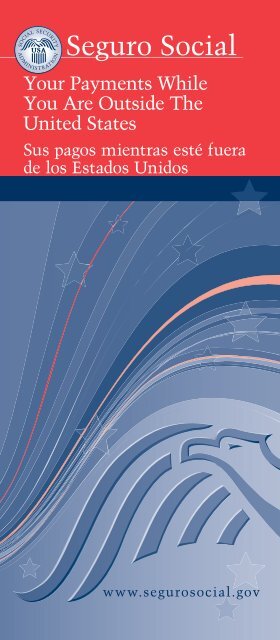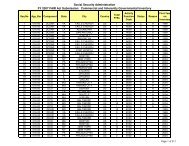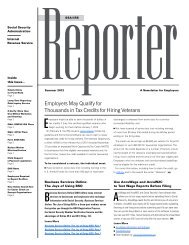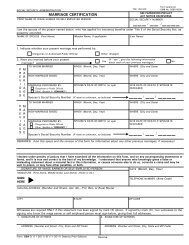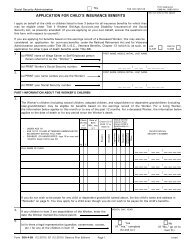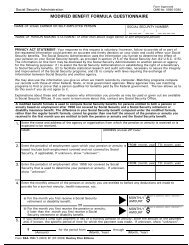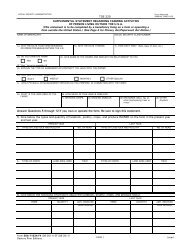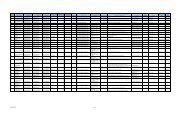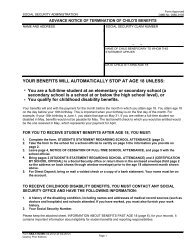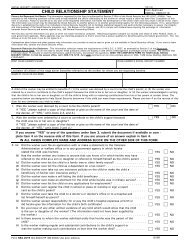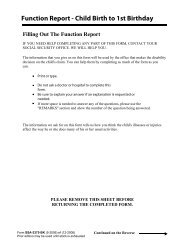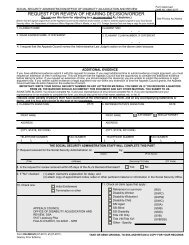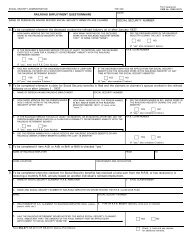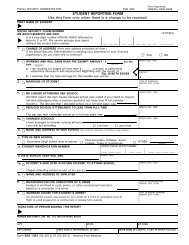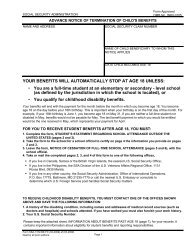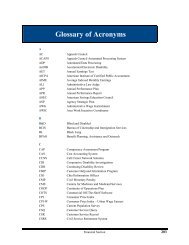Sus pagos mientras esté fuera de los Estados Unidos - Social Security
Sus pagos mientras esté fuera de los Estados Unidos - Social Security
Sus pagos mientras esté fuera de los Estados Unidos - Social Security
Create successful ePaper yourself
Turn your PDF publications into a flip-book with our unique Google optimized e-Paper software.
Your Payments While<br />
You Are Outsi<strong>de</strong> The<br />
United States<br />
<strong>Sus</strong> <strong>pagos</strong> <strong>mientras</strong> <strong>esté</strong> <strong>fuera</strong><br />
<strong>de</strong> <strong>los</strong> <strong>Estados</strong> <strong>Unidos</strong>
Contacting <strong>Social</strong> <strong>Security</strong><br />
Visit our website<br />
Our website, www.socialsecurity.gov,<br />
is a valuable resource for information<br />
about all of <strong>Social</strong> <strong>Security</strong>’s programs.<br />
At our website, you also can request<br />
important documents, such as a<br />
replacement Medicare card or a letter<br />
to confirm your benefit amount.<br />
For more information<br />
If you are outsi<strong>de</strong> the United States,<br />
see pages 14 and 15 for the list of offices<br />
where you can get more information.<br />
If you are in the United States, you<br />
can call us toll-free at 1-800-772-1213.<br />
We treat all calls confi<strong>de</strong>ntially. We can<br />
answer specific questions from 7 a.m.<br />
to 7 p.m., Monday through Friday.<br />
We provi<strong>de</strong> free interpreter services<br />
by phone and in our offices. We can<br />
provi<strong>de</strong> information by automated<br />
phone service 24 hours a day. If you are<br />
<strong>de</strong>af or hard of hearing, you may call<br />
our TTY number, 1-800-325-0778.<br />
We also want to make sure you<br />
receive accurate and courteous service.<br />
That is why we have a second <strong>Social</strong><br />
<strong>Security</strong> representative monitor some<br />
telephone calls.<br />
This publication also is printed<br />
in French, German, Greek, Italian<br />
and Spanish.
What’s insi<strong>de</strong><br />
Introduction . . . . . . . . . . . . . . . . . .4<br />
When you are “outsi<strong>de</strong> the<br />
United States” . . . . . . . . . . . . . . . . .4<br />
What happens to your right<br />
to <strong>Social</strong> <strong>Security</strong> payments<br />
when you are outsi<strong>de</strong> the<br />
United States . . . . . . . . . . . . . . . . . . . 5<br />
Additional resi<strong>de</strong>ncy requirements<br />
for <strong>de</strong>pen<strong>de</strong>nts and survivors . . . .10<br />
Countries to which we<br />
cannot send payments . . . . . . . . . .12<br />
What you need to do to protect<br />
your right to benefits . . . . . . . . . . .13<br />
Things that must be reported . . . .14<br />
How to report . . . . . . . . . . . . . . . .14<br />
If your check is <strong>los</strong>t or stolen . . . .25<br />
Electronic payments . . . . . . . . . . .25<br />
Taxes . . . . . . . . . . . . . . . . . . . . . . .28<br />
What you need to know<br />
about Medicare . . . . . . . . . . . . . . .30<br />
The Spanish version of this booklet<br />
begins on page 32.<br />
El texto en español comienza<br />
en la página 32.
4<br />
Introduction<br />
This booklet explains how being<br />
outsi<strong>de</strong> the United States may affect<br />
your <strong>Social</strong> <strong>Security</strong> payments. It also<br />
tells you what you need to report to<br />
us so we can make sure you receive<br />
all the <strong>Social</strong> <strong>Security</strong> payments you<br />
are entitled to. The information on<br />
page 14 tells what you need to report.<br />
Pages 14 and 15 tell you how to report.<br />
When you are “outsi<strong>de</strong> the<br />
United States”<br />
When we say you are outsi<strong>de</strong><br />
the United States, we mean you<br />
are not in one of the 50 states, the<br />
District of Columbia, Puerto Rico,<br />
the U.S. Virgin Islands, Guam,<br />
the Northern Mariana Islands or<br />
American Samoa. Once you have<br />
been out of the United States for<br />
at least 30 days in a row, you are<br />
consi<strong>de</strong>red to be outsi<strong>de</strong> the country<br />
until you return and stay in the<br />
United States for at least 30 days in<br />
a row. If you are not a U.S. citizen,<br />
you also may have to prove you<br />
were lawfully present in the United<br />
States for that 30-day period. For<br />
more information, contact the<br />
nearest U.S. Embassy, consulate or<br />
<strong>Social</strong> <strong>Security</strong> office.
What happens to your right<br />
to <strong>Social</strong> <strong>Security</strong> payments<br />
when you are outsi<strong>de</strong> the<br />
United States<br />
If you are a U .S . citizen, you<br />
may receive your <strong>Social</strong> <strong>Security</strong><br />
payments outsi<strong>de</strong> the United States<br />
as long as you are eligible for them.<br />
However, there are certain countries<br />
to which we are not allowed to send<br />
payments—see pages 12 and 13 .<br />
If you are a citizen of one of<br />
the countries listed below, <strong>Social</strong><br />
<strong>Security</strong> payments will keep coming<br />
no matter how long you stay outsi<strong>de</strong><br />
the United States as long as you are<br />
eligible for the payments.<br />
• Austria<br />
• Belgium<br />
• Canada<br />
• Chile<br />
• Czech Republic<br />
• Finland<br />
• France<br />
• Germany<br />
• Greece<br />
• Ireland<br />
• Israel<br />
• Italy<br />
• Japan<br />
• Korea (South)<br />
• Luxembourg<br />
• Netherlands<br />
• Norway<br />
• Poland<br />
• Portugal<br />
• Spain<br />
• Swe<strong>de</strong>n<br />
• Switzerland<br />
• United Kingdom<br />
(This list of countries is subject<br />
to change from time to time. For<br />
the latest information, please visit<br />
www.socialsecurity.gov/international/<br />
countrylist1.htm or contact your<br />
5
6<br />
nearest U.S. <strong>Social</strong> <strong>Security</strong> office,<br />
U.S. Embassy or consulate.)<br />
If you are a citizen of one of the<br />
countries listed below, you also may<br />
receive your payments as long as you<br />
are outsi<strong>de</strong> the United States unless<br />
you are receiving your payments as a<br />
<strong>de</strong>pen<strong>de</strong>nt or survivor. In that case,<br />
there are additional requirements you<br />
have to meet—see pages 10 and 11.<br />
• Albania<br />
• Antigua and<br />
Barbuda<br />
• Argentina<br />
• Bahama Islands<br />
• Barbados<br />
• Belize<br />
• Bolivia<br />
• Bosnia-<br />
Herzegovina<br />
• Brazil<br />
• Burkina Faso<br />
• Colombia<br />
• Costa Rica<br />
• Côte d’Ivoire<br />
• Croatia<br />
• Cyprus<br />
• Dominica<br />
• Dominican<br />
Republic<br />
• Ecuador<br />
• El Salvador<br />
• Gabon<br />
• Grenada<br />
• Guatemala<br />
• Guyana<br />
• Hungary<br />
• Iceland<br />
• Jamaica<br />
• Jordan<br />
• Latvia<br />
• Liechtenstein<br />
• Lithuania<br />
• Macedonia<br />
• Malta<br />
• Marshall Islands<br />
• Mexico<br />
• Micronesia,<br />
Fed. States of<br />
• Monaco<br />
• Montenegro<br />
• Nicaragua<br />
• Palau<br />
• Panama<br />
• Peru<br />
• Philippines<br />
• St. Kitts and Nevis<br />
• St. Lucia<br />
• St. Vincent and<br />
the Grenadines
• Samoa (formerly • Slovenia<br />
Western Samoa) • Trinidad-Tobago<br />
• San Marino • Turkey<br />
• Serbia<br />
• Uruguay<br />
• Slovakia<br />
• Venezuela<br />
(This list of countries is subject<br />
to change from time to time. For<br />
the latest information, please visit<br />
www.socialsecurity.gov/international/<br />
countrylist2.htm or contact your<br />
nearest U.S. <strong>Social</strong> <strong>Security</strong> office,<br />
U.S. Embassy or consulate.)<br />
If you are not a U .S . citizen or a<br />
citizen of one of the other countries<br />
listed on pages 5, 6 and 7, your<br />
payments will stop after you have<br />
been outsi<strong>de</strong> the United States for<br />
six full calendar months unless you<br />
meet one of the following exceptions:<br />
• You were eligible for monthly<br />
<strong>Social</strong> <strong>Security</strong> benefits for<br />
December 1956; or<br />
• You are in the active military or<br />
naval service of the United States; or<br />
• The worker on whose record your<br />
benefits are based had railroad work<br />
treated as covered employment by<br />
the <strong>Social</strong> <strong>Security</strong> program; or<br />
• The worker on whose record your<br />
benefits are based died while in the<br />
U.S. military service or as a result of<br />
a service-connected disability and<br />
was not dishonorably discharged; or<br />
• You are a resi<strong>de</strong>nt of a country<br />
with which the United States has<br />
a social security agreement.<br />
7
8<br />
Currently, these countries are:<br />
• Australia<br />
• Italy<br />
• Austria<br />
• Japan<br />
• Belgium<br />
• Korea (South)<br />
• Canada<br />
• Luxembourg<br />
• Chile<br />
• Netherlands<br />
• Czech<br />
• Norway<br />
Republic<br />
• Poland<br />
• Denmark<br />
• Portugal<br />
• Finland<br />
• Spain<br />
• France<br />
• Swe<strong>de</strong>n<br />
• Germany<br />
• Switzerland<br />
• Greece<br />
• United<br />
• Ireland<br />
Kingdom<br />
(This list of countries is subject<br />
to change from time to time. For<br />
the latest information, please<br />
visit www.socialsecurity.gov/<br />
international/countrylist3.htm<br />
or contact your nearest<br />
U.S. <strong>Social</strong> <strong>Security</strong> office,<br />
U.S. Embassy or consulate.)<br />
However, the agreements with<br />
Austria, Belgium, Germany,<br />
Swe<strong>de</strong>n and Switzerland permit<br />
you to receive benefits as a<br />
<strong>de</strong>pen<strong>de</strong>nt or survivor of a worker<br />
while you resi<strong>de</strong> in the foreign<br />
country. This is true only if the<br />
worker is (or was at the time of<br />
<strong>de</strong>ath) a U.S. citizen or a citizen<br />
of your country of resi<strong>de</strong>nce; or<br />
• You are a citizen of one of the<br />
countries listed on page 9, and<br />
the worker on whose record your<br />
benefits are based lived in the
United States for at least 10 years<br />
or earned at least 40 credits un<strong>de</strong>r<br />
the U.S. <strong>Social</strong> <strong>Security</strong> system.<br />
If you are receiving benefits as a<br />
<strong>de</strong>pen<strong>de</strong>nt or survivor, see pages 10<br />
and 11 for additional requirements.<br />
• Afghanistan<br />
• Australia<br />
• Bangla<strong>de</strong>sh<br />
• Bhutan<br />
• Botswana<br />
• Burma<br />
• Burundi<br />
• Cameroon<br />
• Cape Ver<strong>de</strong><br />
• Central African<br />
Republic<br />
• Chad<br />
• China<br />
• Congo, Rep. of<br />
• Ethiopia<br />
• Fiji<br />
• Gambia<br />
• Ghana<br />
• Haiti<br />
• Honduras<br />
• India<br />
• Indonesia<br />
• Kenya<br />
• Laos<br />
• Lebanon<br />
• Lesotho<br />
• Liberia<br />
• Madagascar<br />
• Malawi<br />
• Malaysia<br />
• Mali<br />
• Mauritania<br />
• Mauritius<br />
• Morocco<br />
• Nepal<br />
• Nigeria<br />
• Pakistan<br />
• Senegal<br />
• Sierra Leone<br />
• Singapore<br />
• Solomon Islands<br />
• Somalia<br />
• South Africa<br />
• Sri Lanka<br />
• Sudan<br />
• Swaziland<br />
• Taiwan<br />
• Tanzania<br />
• Thailand<br />
• Togo<br />
• Tonga<br />
• Tunisia<br />
• Uganda<br />
• Yemen<br />
9
10<br />
(This list of countries is subject<br />
to change from time to time. For<br />
the latest information, please visit<br />
www.socialsecurity.gov/international/<br />
countrylist4.htm or contact your<br />
nearest U.S. <strong>Social</strong> <strong>Security</strong> office,<br />
U.S. Embassy or consulate.) If<br />
you are not a citizen of one of the<br />
countries listed on page 9, you cannot<br />
use this exception.<br />
If you are not a U.S. citizen and<br />
none of these exceptions applies to<br />
you, your payments will stop after<br />
you have been outsi<strong>de</strong> the United<br />
States for six full months. Once<br />
this happens, we cannot start your<br />
payments again until you come back<br />
and stay in the United States for a<br />
whole calendar month. You have to<br />
be in the United States on the first<br />
minute of the first day of a month and<br />
stay through the last minute of the<br />
last day of that month. In addition,<br />
you may be required to prove that<br />
you have been lawfully present in the<br />
United States for the full calendar<br />
month. For more information, contact<br />
the nearest U.S. Embassy, consulate or<br />
<strong>Social</strong> <strong>Security</strong> office.<br />
Additional resi<strong>de</strong>ncy<br />
requirements for <strong>de</strong>pen<strong>de</strong>nts<br />
and survivors<br />
If you receive benefits as a<br />
<strong>de</strong>pen<strong>de</strong>nt or survivor of a worker,<br />
special requirements may affect<br />
your right to receive <strong>Social</strong> <strong>Security</strong><br />
payments while you are outsi<strong>de</strong>
the United States. If you are not a<br />
U.S. citizen, you must have lived in<br />
the United States for at least five<br />
years. During those five years, the<br />
family relationship on which benefits<br />
are based must have existed.<br />
Children may meet this resi<strong>de</strong>ncy<br />
requirement on their own or may be<br />
consi<strong>de</strong>red as meeting the resi<strong>de</strong>ncy<br />
requirement if the worker and other<br />
parent (if any) meet it. However,<br />
children adopted outsi<strong>de</strong> the United<br />
States will not be paid outsi<strong>de</strong> the<br />
United States, even if the resi<strong>de</strong>ncy<br />
requirement is met.<br />
The resi<strong>de</strong>ncy requirement will<br />
not apply to you if you meet any of<br />
the following conditions:<br />
• You were initially eligible for monthly<br />
benefits before January 1, 1985;<br />
• You are entitled on the record of<br />
a worker who died while in the<br />
U.S. military service or as a result of<br />
a service-connected disease or injury;<br />
• You are a citizen of one of the<br />
countries listed on page 5; or<br />
• You are a resi<strong>de</strong>nt of one of<br />
the countries with which<br />
the United States has a social<br />
security agreement. These<br />
countries are listed on page 8.<br />
11
12<br />
Countries to which we cannot<br />
send payments<br />
U .S . Treasury regulations<br />
U.S. Department of the Treasury<br />
regulations prohibit sending<br />
payments to you if you are in<br />
Cuba or North Korea. If you are<br />
a U.S. citizen and are in Cuba or<br />
North Korea, you can receive all<br />
of your withheld payments once<br />
you leave that country and go to<br />
another country where we can send<br />
payments. Generally, if you are not a<br />
U.S. citizen, you cannot receive any<br />
payments for months in which you<br />
live in one of these countries, even if<br />
you leave that country and satisfy all<br />
other requirements.<br />
<strong>Social</strong> <strong>Security</strong> restrictions<br />
<strong>Social</strong> <strong>Security</strong> restrictions prohibit<br />
sending payments to individuals in<br />
Cambodia, Vietnam or areas that<br />
were in the former Soviet Union<br />
(other than Armenia, Estonia, Latvia,<br />
Lithuania and Russia). Generally, you<br />
cannot receive payments while you<br />
are in one of these countries, and<br />
we cannot send your payments to<br />
anyone for you. However, exceptions<br />
can be ma<strong>de</strong> for certain eligible<br />
beneficiaries in countries with <strong>Social</strong><br />
<strong>Security</strong> restrictions in place.<br />
To qualify for an exception, you<br />
must agree to the conditions of<br />
payment. One of the conditions<br />
is that you must appear in person
at the U.S. Embassy each month<br />
to receive your benefits. Contact<br />
your nearest U.S. <strong>Social</strong> <strong>Security</strong><br />
office, U.S. Embassy or consulate for<br />
additional information about these<br />
conditions and whether you might<br />
qualify for an exception.<br />
If you do not qualify for payment<br />
un<strong>de</strong>r this procedure, you can<br />
receive all of the payments for which<br />
you were eligible (but which were<br />
withheld because of <strong>Social</strong> <strong>Security</strong><br />
restrictions) once you leave that<br />
country and go to another country<br />
where we can send payments.<br />
What you need to do to protect<br />
your right to benefits<br />
If you are living outsi<strong>de</strong> the United<br />
States, periodically we will send<br />
you a questionnaire. This lets us<br />
figure out if you still are eligible for<br />
benefits. Return the questionnaire<br />
to the office that sent it as soon<br />
as possible. If you do not, your<br />
payments will stop.<br />
In addition to responding to the<br />
questionnaire, notify us promptly<br />
about changes that could affect<br />
your payments. If you fail to report<br />
something or <strong>de</strong>liberately make<br />
a false statement, you could be<br />
penalized by a fine or imprisonment.<br />
You also may <strong>los</strong>e some of your<br />
payments if you do not report<br />
changes promptly.<br />
13
14<br />
Things that must be reported<br />
Listed below are things that must<br />
be reported. An explanation of each<br />
is given on the page listed.<br />
Page 15 Change of address<br />
Page 16 Work outsi<strong>de</strong> the U.S.<br />
Page 20 If you return to work or your<br />
disability improves<br />
Page 21 Marriage<br />
Page 21 Divorce or annulment<br />
Page 22 Adoption of a child<br />
Page 22 Child leaves the care of a<br />
spouse or surviving spouse<br />
Page 22 Child nearing age 18<br />
is a full-time stu<strong>de</strong>nt<br />
or is disabled<br />
Page 23 Death<br />
Page 23 Inability to manage funds<br />
Page 24 Deportation or removal from<br />
the U.S.<br />
Page 24 Changes in parental<br />
circumstances<br />
Page 24 Eligibility for a pension<br />
from work not covered<br />
by <strong>Social</strong> <strong>Security</strong><br />
How to report<br />
You can report by contacting us<br />
in person, by mail or by telephone.<br />
If you live in the British Virgin<br />
Islands, Canada or Samoa, you can<br />
send your report to the nearest<br />
U.S. <strong>Social</strong> <strong>Security</strong> office. If you live<br />
in Mexico, you can send your report
to the nearest U.S. <strong>Social</strong> <strong>Security</strong><br />
office, U.S. Embassy or consulate. If<br />
you live in the Philippines, you can<br />
send your report to:<br />
Veterans Affairs Regional Office<br />
SSA Division<br />
1131 Roxas Boulevard<br />
0930 Manila, Philippines<br />
In all other countries, you can<br />
send your report to the nearest<br />
U.S. Embassy or consulate. Visit<br />
www.socialsecurity.gov/foreign for<br />
a complete list of these offices.<br />
If you find it easier to contact us<br />
by mail, send your report by airmail<br />
to the following address:<br />
<strong>Social</strong> <strong>Security</strong> Administration<br />
P.O. Box 17769<br />
Baltimore, MD 21235-7769<br />
USA<br />
When you contact us, inclu<strong>de</strong> the<br />
following information:<br />
• Name of person or persons about<br />
whom the report is being ma<strong>de</strong>;<br />
• What is being reported and<br />
the date it happened; and<br />
• The claim number that appears on<br />
the letters or other correspon<strong>de</strong>nce<br />
we send you. (This is a nine-digit<br />
number—000-00-0000—followed<br />
by a letter or a letter and a number.)<br />
Change of address<br />
Tell us if your address changes<br />
so your checks will not be <strong>los</strong>t or<br />
<strong>de</strong>layed. Even if your payments are<br />
15
16<br />
being sent to a bank or another<br />
financial institution, report any<br />
change in your home address.<br />
When you write to the<br />
U.S. Embassy, consulate or the<br />
<strong>Social</strong> <strong>Security</strong> Administration about<br />
a change of address, please type or<br />
print your new address carefully and<br />
be sure to inclu<strong>de</strong> the country and<br />
ZIP or postal co<strong>de</strong>. Also, be sure to<br />
list the names of all your family<br />
members who will be moving to the<br />
new address.<br />
Work outsi<strong>de</strong> the United States<br />
If you work or own a business<br />
outsi<strong>de</strong> the United States and are<br />
younger than full retirement age,<br />
notify the nearest U.S. Embassy,<br />
consulate or <strong>Social</strong> <strong>Security</strong> office<br />
right away. If you do not, it could<br />
result in a penalty that could cause<br />
the <strong>los</strong>s of benefits. This <strong>los</strong>s of<br />
benefits is in addition to benefits<br />
that may be withheld un<strong>de</strong>r one<br />
of the work tests explained on the<br />
following pages.<br />
For people born in 1937 or earlier,<br />
full retirement age is 65. Beginning<br />
with people born in 1938, full<br />
retirement age increases gradually<br />
until it reaches age 67 for those born<br />
in 1960 or later.<br />
Report your work even if the job<br />
is part-time or you are self-employed.<br />
Some examples of the types of<br />
work that should be reported are:<br />
work as an apprentice, farmer, sales
epresentative, tutor, writer, etc. If<br />
you own a business, notify us even<br />
if you do not work in the business or<br />
receive any income from it.<br />
If a child beneficiary (regardless<br />
of age) begins an apprenticeship,<br />
notify the nearest U.S. Embassy,<br />
consulate or the <strong>Social</strong> <strong>Security</strong><br />
Administration. An apprenticeship<br />
may be consi<strong>de</strong>red work un<strong>de</strong>r the<br />
<strong>Social</strong> <strong>Security</strong> program.<br />
The following work tests may<br />
affect the amount of your monthly<br />
benefit payment. Work after full<br />
retirement age does not affect the<br />
payment of benefits.<br />
The foreign work test<br />
Benefits are withheld for each<br />
month a beneficiary younger than<br />
full retirement age works more than<br />
45 hours outsi<strong>de</strong> the United States<br />
in employment or self-employment<br />
not subject to U.S. <strong>Social</strong> <strong>Security</strong><br />
taxes. It does not matter how much<br />
was earned or how many hours were<br />
worked each day.<br />
A person is consi<strong>de</strong>red to be<br />
working on any day he or she:<br />
• Works as an employee or selfemployed<br />
person;<br />
• Has an agreement to work even if<br />
he or she does not actually work<br />
because of sickness, vacation, etc.; or<br />
• Is the owner or part owner of a<br />
tra<strong>de</strong> or business even if he or she<br />
does not actually work in the tra<strong>de</strong><br />
17
18<br />
or business or receive any income<br />
from it.<br />
Generally, if a retired worker’s<br />
benefits are withheld because of<br />
his or her work, no benefits can<br />
be paid to anyone else receiving<br />
benefits on his or her record for<br />
those months. However, the work<br />
of others receiving benefits on the<br />
worker’s record affects only their<br />
own benefits.<br />
The annual retirement test<br />
Un<strong>de</strong>r certain conditions, work<br />
performed outsi<strong>de</strong> the United States<br />
by U.S. citizens or resi<strong>de</strong>nts is<br />
covered by the U.S. <strong>Social</strong> <strong>Security</strong><br />
program. If your work is covered by<br />
U.S. <strong>Social</strong> <strong>Security</strong>, the same annual<br />
retirement test that applies to people<br />
in the United States applies to you.<br />
NOTE: Work by some U.S. citizens<br />
and resi<strong>de</strong>nts outsi<strong>de</strong> the United<br />
States is exempt from U.S. <strong>Social</strong><br />
<strong>Security</strong> as a result of international<br />
social security agreements the<br />
United States has conclu<strong>de</strong>d<br />
with the following countries:<br />
• Australia<br />
• Austria<br />
• Belgium<br />
• Canada<br />
• Chile<br />
• Czech Republic<br />
• Denmark<br />
• Finland<br />
• France<br />
• Germany<br />
• Greece<br />
• Ireland<br />
• Italy<br />
• Japan<br />
• Korea (South)<br />
• Luxembourg
• Netherlands<br />
• Norway<br />
• Poland<br />
• Portugal<br />
• Spain<br />
• Swe<strong>de</strong>n<br />
• Switzerland<br />
• United Kingdom<br />
(This list of countries is subject<br />
to change from time to time. For<br />
the latest information, please visit<br />
www.socialsecurity.gov/international/<br />
countrylist5.htm or contact your<br />
nearest U.S. <strong>Social</strong> <strong>Security</strong> office,<br />
U.S. Embassy or consulate.)<br />
If you are working in one of these<br />
countries and your earnings are<br />
exempt from U.S. <strong>Social</strong> <strong>Security</strong><br />
taxes because of the agreement,<br />
your benefits will be subject to<br />
the foreign work test <strong>de</strong>scribed on<br />
page 17. For further information on<br />
how your benefits may be affected<br />
by an agreement, contact the nearest<br />
U.S. Embassy, consulate or <strong>Social</strong><br />
<strong>Security</strong> office.<br />
If your work is covered by the<br />
U.S. <strong>Social</strong> <strong>Security</strong> program, you<br />
can receive all benefits due you for<br />
the year if your earnings do not<br />
exceed the annual exempt amount.<br />
This limit changes each year. If you<br />
want to know the current limit,<br />
ask at any U.S. Embassy, consulate<br />
or <strong>Social</strong> <strong>Security</strong> office, or write<br />
to us at the address shown un<strong>de</strong>r<br />
“How to report” on pages 14 and 15.<br />
If your earnings go over the limit,<br />
some or all of your benefits will be<br />
reduced by your earnings.<br />
19
20<br />
• If you are younger than full<br />
retirement age, $1 in benefits will<br />
be withheld for each $2 in earnings<br />
above the limit.<br />
• In the year you reach full retirement<br />
age, your benefits will be reduced<br />
$1 for every $3 you earn over a<br />
different annual exempt amount<br />
until the month you reach full<br />
retirement age.<br />
Count your earnings for the whole<br />
year in figuring the benefits due you.<br />
For most people, this means earnings<br />
from January through December.<br />
People who reach full retirement<br />
age can receive all of their benefits<br />
with no limit on their earnings.<br />
The year your benefits start<br />
In figuring your total earnings for<br />
the year in which you first become<br />
entitled to benefits, count earnings in<br />
that year for months both before and<br />
after you became entitled.<br />
The year you reach age 18<br />
Your benefits as a child stop at age<br />
18 unless you are a full-time stu<strong>de</strong>nt<br />
in an elementary or secondary<br />
school, or you are disabled. Your<br />
earnings for the entire year in which<br />
you reach age 18 count in figuring<br />
the amount of benefits due you for<br />
the year regardless of whether your<br />
payments continue or stop at age 18.<br />
If you return to work or<br />
your disability improves<br />
If you receive payments because you<br />
are disabled, let us know right away
if your condition improves or you go<br />
back to work. You can keep receiving<br />
payments for up to nine months while<br />
you are working. This nine-month<br />
period is called a “trial work period.”<br />
The trial work period gives you a<br />
chance to test whether you are able to<br />
work without worrying about having<br />
your payments stopped. If, after nine<br />
months, you are able to continue<br />
working, you will get payments for<br />
three more months before they stop.<br />
If you are not able to keep working,<br />
you will continue to receive disability<br />
benefits.<br />
Marriage<br />
Let us know if anyone receiving<br />
benefits gets married. In some<br />
cases, <strong>Social</strong> <strong>Security</strong> payments stop<br />
after marriage. In other cases, the<br />
amount of the payments changes.<br />
This <strong>de</strong>pends on the kind of benefits<br />
received and, sometimes, on whether<br />
the person you marry gets payments.<br />
Divorce or annulment<br />
Notify us if your marriage is<br />
annulled or you get a divorce.<br />
Divorce or annulment does not<br />
necessarily mean that your <strong>Social</strong><br />
<strong>Security</strong> payments will stop. If you<br />
are receiving payments based on<br />
your own work record, divorce or<br />
annulment of your marriage will not<br />
affect your payments. Also, if you are<br />
a spouse age 62 or ol<strong>de</strong>r and you were<br />
married to the worker for 10 years or<br />
more, your payments will continue<br />
21
22<br />
even if you divorce. Contact us if your<br />
name has changed so we can show<br />
your new name on your payments.<br />
Adoption of a child<br />
When a child is adopted, let us<br />
know the child’s new name, the date<br />
of the adoption <strong>de</strong>cree and the adopting<br />
parents’ names and addresses.<br />
Child leaves the care of a<br />
spouse or surviving spouse<br />
If you are a spouse or surviving<br />
spouse receiving benefits because you<br />
are caring for a child who is un<strong>de</strong>r<br />
age 16 or who was disabled before age<br />
22, notify us right away if the child<br />
leaves your care. If you do not, it<br />
could result in a penalty that would<br />
cause an additional <strong>los</strong>s of benefits.<br />
A temporary separation may not<br />
affect your benefits as long as you<br />
still have parental control over the<br />
child. Tell us if there is any change<br />
in where you or the child lives, or if<br />
you no longer have responsibility for<br />
the child. If the child returns to your<br />
care, you should tell us that also.<br />
Child nearing age 18 is a<br />
full-time stu<strong>de</strong>nt or is disabled<br />
Payments to a child will stop<br />
when the child reaches age 18 unless<br />
he or she is unmarried and either<br />
disabled or a full-time stu<strong>de</strong>nt at an<br />
elementary or secondary school.<br />
If a child age 18 or over is receiving<br />
payments as a stu<strong>de</strong>nt, notify us<br />
immediately if the stu<strong>de</strong>nt:
• Drops out of school;<br />
• Changes schools;<br />
• Changes from full-time to parttime<br />
attendance;<br />
• Is expelled or suspen<strong>de</strong>d;<br />
• Is paid by his or her employer for<br />
attending school;<br />
• Marries; or<br />
• Begins working.<br />
If a child whose payments were<br />
stopped at age 18 becomes disabled<br />
before age 22 or is unmarried and<br />
enters elementary or secondary<br />
school on a full-time basis before<br />
age 19, notify us so we can resume<br />
sending payments to the child. Also,<br />
a disabled child who recovers from a<br />
disability can have payments started<br />
again if he or she becomes disabled<br />
again within seven years.<br />
Death<br />
If a person who receives <strong>Social</strong><br />
<strong>Security</strong> benefits dies, a benefit is<br />
not payable for the month of <strong>de</strong>ath.<br />
For example, if a beneficiary died any<br />
time in June, the payment dated July<br />
(which is payment for June) should be<br />
returned to the sen<strong>de</strong>r.<br />
Inability to manage funds<br />
Some people who receive <strong>Social</strong><br />
<strong>Security</strong> payments cannot manage<br />
their own funds. The person who<br />
takes care of the beneficiary should<br />
let us know. We can arrange to send<br />
the payments to a relative or other<br />
person who can act on behalf of the<br />
23
24<br />
beneficiary. We call this person a<br />
“representative payee.”<br />
Deportation or removal<br />
from the United States<br />
If you are <strong>de</strong>ported or removed<br />
from the United States for certain<br />
reasons, your <strong>Social</strong> <strong>Security</strong> benefits<br />
are stopped and cannot be started<br />
again unless you are lawfully<br />
admitted to the United States for<br />
permanent resi<strong>de</strong>nce.<br />
Even if you are <strong>de</strong>ported or<br />
removed, your <strong>de</strong>pen<strong>de</strong>nts can receive<br />
benefits if they are U.S. citizens; or,<br />
if not U.S. citizens, they can still<br />
receive benefits if they stay in the<br />
United States for the entire month.<br />
But they cannot receive benefits for<br />
any month if they spend any part of it<br />
outsi<strong>de</strong> the United States.<br />
Changes in parental<br />
circumstances<br />
Payments to a child who is not a<br />
U.S. citizen could stop or start when<br />
certain changes occur. Let us know<br />
when the child’s natural, adoptive<br />
or stepparent dies, marries or gets<br />
a divorce (or annulment), even if<br />
that person does not receive <strong>Social</strong><br />
<strong>Security</strong> payments.<br />
Eligibility for a pension<br />
from work not covered<br />
by <strong>Social</strong> <strong>Security</strong><br />
Your U.S. <strong>Social</strong> <strong>Security</strong> benefit<br />
may be smaller if you become
entitled to a U.S. <strong>Social</strong> <strong>Security</strong><br />
retirement or disability benefit and<br />
start to receive another monthly<br />
pension, such as a foreign social<br />
security or private pension, based in<br />
whole or in part on work not covered<br />
by U.S. <strong>Social</strong> <strong>Security</strong>. We may use<br />
a different formula to figure your<br />
U.S. <strong>Social</strong> <strong>Security</strong> benefit. For more<br />
information, ask at any U.S. Embassy,<br />
consulate or <strong>Social</strong> <strong>Security</strong> office<br />
for Windfall Elimination Provision<br />
(Publication No. 05-10045).<br />
If your check is <strong>los</strong>t or stolen<br />
It usually takes longer to <strong>de</strong>liver<br />
checks outsi<strong>de</strong> the United States.<br />
Delivery time varies from country<br />
to country and your check may not<br />
arrive the same day each month. If<br />
you do not receive your check after a<br />
reasonable waiting period, or if it is<br />
<strong>los</strong>t or stolen, contact the nearest U.S.<br />
Embassy or consulate or write directly<br />
to the <strong>Social</strong> <strong>Security</strong> Administration.<br />
Our address is on page 15.<br />
We will replace your check as<br />
soon as possible. But please make<br />
every effort to keep your check safe,<br />
because it will take some time to<br />
replace a check while you are outsi<strong>de</strong><br />
the country.<br />
Electronic payments<br />
If you apply for <strong>Social</strong> <strong>Security</strong><br />
benefits on or after May 1, 2011, and<br />
resi<strong>de</strong> in the United States, you must<br />
25
26<br />
receive your payments electronically.<br />
If you did not sign up for electronic<br />
payments when you applied for<br />
benefits, we strongly urge you to do<br />
it now. You must switch to electronic<br />
payments by March 1, 2013, if you<br />
resi<strong>de</strong> in the United States. If you<br />
don’t switch, the U.S. Department<br />
of the Treasury automatically will<br />
send your benefits via the Direct<br />
Express ® card program to avoid any<br />
interruption in payment.<br />
Direct <strong>de</strong>posit is a simple, safe and<br />
secure way to receive your benefits<br />
while residing insi<strong>de</strong> the U.S. and<br />
while residing in many countries<br />
outsi<strong>de</strong> of the U.S. Even if you use<br />
the direct <strong>de</strong>posit service, you must<br />
keep us informed of any change in<br />
your current resi<strong>de</strong>nce address.<br />
Direct <strong>de</strong>posit has several<br />
advantages. You never have to worry<br />
about your check being <strong>de</strong>layed in<br />
the mail, <strong>los</strong>t or stolen. With direct<br />
<strong>de</strong>posit you receive your payment<br />
much faster than if you are paid by<br />
check (usually one to three weeks<br />
faster than check <strong>de</strong>liveries). You also<br />
avoid check cashing and currency<br />
conversion fees. Some countries<br />
where direct <strong>de</strong>posit payments are<br />
available inclu<strong>de</strong>:<br />
• Anguilla<br />
• Antigua &<br />
Barbuda<br />
• Australia<br />
• Austria<br />
• Bahama Islands<br />
• Barbados<br />
• Belgium<br />
• British Virgin<br />
Islands<br />
• Canada<br />
• Cayman Islands
• Cyprus<br />
• Denmark<br />
• Dominican<br />
Republic<br />
• Estonia<br />
• Finland<br />
• France<br />
• Germany<br />
• Greece<br />
• Grenada<br />
• Haiti<br />
• Hong Kong<br />
• Hungary<br />
• India<br />
• Ireland<br />
• Israel<br />
• Italy<br />
• Jamaica<br />
• Japan<br />
• Malta<br />
• Mexico<br />
• Netherlands<br />
• Netherlands<br />
Antilles<br />
• New Zealand<br />
• Norway<br />
• Panama<br />
• Poland<br />
• Portugal<br />
• St. Kitts<br />
and Nevis<br />
• St. Lucia<br />
• St. Vincent and<br />
the Grenadines<br />
• South Africa<br />
• Spain<br />
• Swe<strong>de</strong>n<br />
• Switzerland<br />
• Trinidad-Tobago<br />
• United Kingdom<br />
(This list of countries is subject<br />
to change from time to time. For<br />
the latest information, please visit<br />
www.socialsecurity.gov/international/<br />
countrylist6.htm or contact your<br />
nearest U.S. <strong>Social</strong> <strong>Security</strong> office,<br />
U.S. Embassy or consulate.)<br />
To <strong>de</strong>termine if direct <strong>de</strong>posit<br />
is available in the country<br />
where you live—or to sign up<br />
for direct <strong>de</strong>posit—contact the<br />
nearest U.S. Embassy, consulate<br />
or U.S. <strong>Social</strong> <strong>Security</strong> office, or<br />
write to the address on page 15.<br />
The Direct Express ® card is a<br />
<strong>de</strong>bit card you can use to access<br />
your benefits. And you don’t need<br />
27
28<br />
a bank account. With the Direct<br />
Express ® card program, we <strong>de</strong>posit<br />
your fe<strong>de</strong>ral benefit payment directly<br />
onto your card account. Your<br />
monthly benefits will be available<br />
on your payment day – on time,<br />
every time. You can use the card<br />
to make purchases, pay bills or get<br />
cash at thousands of locations. And<br />
many transactions are free. Call the<br />
toll-free Direct Express ® hotline at<br />
1-877-212-9991 or sign up online at<br />
www.USDirectExpress.com. If you<br />
are outsi<strong>de</strong> the United States, call<br />
the international number (collect) at<br />
1-765-778-6290 for Direct Express ®<br />
services. Also <strong>Social</strong> <strong>Security</strong> can<br />
help you sign up.<br />
Taxes<br />
If you are a U.S. citizen or<br />
U.S. resi<strong>de</strong>nt, up to 85 percent of<br />
the <strong>Social</strong> <strong>Security</strong> benefits you<br />
receive may be subject to the fe<strong>de</strong>ral<br />
income tax.<br />
If you file a fe<strong>de</strong>ral income tax<br />
return as an individual and your<br />
combined income is $25,000 to<br />
$34,000, you may have to pay taxes<br />
on up to 50 percent of your <strong>Social</strong><br />
<strong>Security</strong> benefits. “Combined<br />
income” means your adjusted gross<br />
income plus nontaxable interest<br />
plus one-half of your <strong>Social</strong> <strong>Security</strong><br />
benefits. If your combined income is<br />
over $34,000, you may have to pay<br />
taxes on up to 85 percent of your<br />
<strong>Social</strong> <strong>Security</strong> benefits.
If you file a joint tax return, you<br />
may have to pay taxes on up to<br />
50 percent of your <strong>Social</strong> <strong>Security</strong><br />
benefits if you and your spouse have<br />
a combined income of $32,000 to<br />
$44,000. If your combined income is<br />
over $44,000, you may have to pay<br />
taxes on up to 85 percent of your<br />
<strong>Social</strong> <strong>Security</strong> benefits.<br />
If you are a member of a couple and<br />
file a separate return, you probably<br />
will pay taxes on your benefits.<br />
If you are not a U.S. citizen or a<br />
U.S. resi<strong>de</strong>nt, fe<strong>de</strong>ral income taxes<br />
will be withheld from your benefits.<br />
The tax is 30 percent of 85 percent of<br />
your benefit amount.<br />
It will be withheld from the benefits<br />
of all nonresi<strong>de</strong>nt aliens, except<br />
those who resi<strong>de</strong> in countries that<br />
have tax treaties with the United<br />
States that do not permit taxing<br />
of U.S. <strong>Social</strong> <strong>Security</strong> benefits (or<br />
provi<strong>de</strong> for a lower tax rate). The<br />
United States has such treaties<br />
with Canada, Egypt, Germany,<br />
Ireland, Israel, Italy, Japan, Romania,<br />
Switzerland and the United Kingdom<br />
(<strong>de</strong>fined as England, Scotland, Wales<br />
and Northern Ireland). Un<strong>de</strong>r the tax<br />
treaty with Switzerland, benefits paid<br />
to resi<strong>de</strong>nts of Switzerland who are<br />
not U.S. citizens are taxed at a rate<br />
of 15 percent. In addition, the <strong>Social</strong><br />
<strong>Security</strong> benefits paid to individuals<br />
who are both nationals and resi<strong>de</strong>nts of<br />
India are exempt from this tax to the<br />
extent that their benefits are based on<br />
29
30<br />
U.S. fe<strong>de</strong>ral, state or local government<br />
employment. (This list of countries<br />
may change from time to time.)<br />
After the end of the year, you will<br />
receive a statement showing the<br />
amount of benefits you were paid<br />
during the year.<br />
Many foreign governments do<br />
tax U.S. <strong>Social</strong> <strong>Security</strong> benefits.<br />
U.S. resi<strong>de</strong>nts planning to live in<br />
another country should contact that<br />
country’s embassy in Washington,<br />
D.C., for information.<br />
<strong>Social</strong> <strong>Security</strong> benefits are<br />
calculated in U.S. dollars. The<br />
benefits are not increased or<br />
<strong>de</strong>creased because of changes in<br />
international exchange rates.<br />
What you need to know<br />
about Medicare<br />
Medicare is a health insurance<br />
program for eligible people who are<br />
age 65 or ol<strong>de</strong>r, or disabled.<br />
Medicare has four parts<br />
• Hospital insurance (Part A) helps<br />
pay for inpatient care in a hospital<br />
or skilled nursing facility<br />
(following a hospital stay), some<br />
home health care and hospice care.<br />
• Medical insurance (Part B) helps<br />
pay for doctors’ services and<br />
many other medical services<br />
and supplies that are not covered<br />
by hospital insurance.<br />
• Medicare Advantage (Part C) plans<br />
are available in many areas. People
with Medicare Parts A and B can<br />
choose to receive all of their health<br />
care services through one of these<br />
provi<strong>de</strong>r organizations un<strong>de</strong>r Part C.<br />
• Prescription drug coverage (Part D)<br />
helps pay for medications doctors<br />
prescribe for treatment.<br />
Medicare generally does not cover<br />
health services you get outsi<strong>de</strong> the<br />
United States. The hospital insurance<br />
part of Medicare is available to you<br />
if you return to the United States.<br />
No monthly premium is withheld<br />
from your benefit payment for this<br />
protection.<br />
If you want the medical insurance<br />
part of Medicare, you must enroll.<br />
There is a monthly premium that<br />
normally will be withheld from<br />
your payment.<br />
Because Medicare benefits are<br />
available only in the United States, it<br />
may not be to your advantage to sign<br />
up and pay the premium for medical<br />
insurance if you will be out of the<br />
United States for a long period of<br />
time. But you should be aware that<br />
your premium, when you do sign up,<br />
will be 10 percent higher for each<br />
12-month period you could have been<br />
enrolled but were not.<br />
If you already are covered by<br />
medical insurance and wish<br />
to cancel it, notify us. Medical<br />
insurance—and premiums—will<br />
continue for one more month after<br />
the month you notify us that you<br />
wish to cancel.<br />
31
Comuníquese con el Seguro <strong>Social</strong><br />
Visite nuestro sitio <strong>de</strong> Internet<br />
Nuestro sitio <strong>de</strong> Internet,<br />
www.segurosocial.gov, contiene<br />
información valiosa sobre todos <strong>los</strong><br />
programas <strong>de</strong>l Seguro <strong>Social</strong>. En<br />
nuestro sitio <strong>de</strong> Internet también pue<strong>de</strong><br />
obtener <strong>los</strong> formularios necesarios para<br />
solicitar documentos importantes,<br />
tales como una tarjeta <strong>de</strong> reemplazo <strong>de</strong><br />
Medicare, o un documento confirmando<br />
la cantidad <strong>de</strong> su beneficio.<br />
Algunos <strong>de</strong> estos servicios están<br />
disponibles solamente en inglés.<br />
Para informarse mejor<br />
Si se encuentra <strong>fuera</strong> <strong>de</strong> <strong>los</strong><br />
<strong>Estados</strong> <strong>Unidos</strong>, vea la página 45 para<br />
una lista <strong>de</strong> las oficinas don<strong>de</strong> pue<strong>de</strong><br />
obtener más información.<br />
Si se encuentra en <strong>los</strong> <strong>Estados</strong> <strong>Unidos</strong>,<br />
pue<strong>de</strong> llamar a nuestro número gratis,<br />
1-800-772-1213. Tratamos todas nuestras<br />
llamadas confi<strong>de</strong>ncialmente. Si <strong>de</strong>sea el<br />
servicio en español, oprima el 2 y espere<br />
a que le atienda un agente. Po<strong>de</strong>mos<br />
contestar preguntas específicas, <strong>de</strong> lunes<br />
a viernes, <strong>de</strong>s<strong>de</strong> las 7 a.m. hasta las 7 p.m.<br />
Ofrecemos servicios <strong>de</strong> intérprete gratis<br />
tanto por teléfono como en nuestras oficinas.<br />
A<strong>de</strong>más, ofrecemos información telefónica<br />
automatizada las 24 horas <strong>de</strong>l día. Si es sordo<br />
o tiene problemas <strong>de</strong> audición pue<strong>de</strong> llamar<br />
a nuestro número TTY 1-800-325-0778.<br />
Como también queremos asegurarnos<br />
que reciba el servicio más cortés y<br />
correcto, es posible que un segundo agente<br />
escuche algunas llamadas.<br />
Esta publicación se ofrece también en<br />
Alemán, Francés, Griego, Inglés e Italiano.
Lo que hay a<strong>de</strong>ntro<br />
Introducción . . . . . . . . . . . . . . .34<br />
Cuando está «<strong>fuera</strong> <strong>de</strong> <strong>los</strong><br />
<strong>Estados</strong> <strong>Unidos</strong>» . . . . . . . . . . . .34<br />
Lo que suce<strong>de</strong> con su <strong>de</strong>recho<br />
a <strong>pagos</strong> <strong>de</strong> Seguro <strong>Social</strong><br />
cuando está <strong>fuera</strong><br />
<strong>de</strong> <strong>los</strong> <strong>Estados</strong> <strong>Unidos</strong> . . . . . . . .35<br />
Requisitos adicionales <strong>de</strong><br />
resi<strong>de</strong>ncia para <strong>de</strong>pendientes y<br />
sobrevivientes . . . . . . . . . . . . . .40<br />
Países a <strong>los</strong> cuales no<br />
po<strong>de</strong>mos enviar <strong>pagos</strong> . . . . . . . .42<br />
Lo que necesita hacer para<br />
proteger su <strong>de</strong>recho<br />
a beneficios . . . . . . . . . . . . . . . .43<br />
Cosas que <strong>de</strong>ben informarse . . .44<br />
Cómo informar . . . . . . . . . . . . .45<br />
Si se pier<strong>de</strong> su cheque<br />
o se lo roban . . . . . . . . . . . . . . .56<br />
Pagos por<br />
transferencia electrónica . . . . . .57<br />
Impuestos . . . . . . . . . . . . . . . . .59<br />
Lo que necesita saber<br />
sobre Medicare . . . . . . . . . . . . .62
34<br />
Introducción<br />
Esta publicación explica cómo el<br />
hecho <strong>de</strong> estar <strong>fuera</strong> <strong>de</strong> <strong>los</strong> <strong>Estados</strong><br />
<strong>Unidos</strong> pue<strong>de</strong> afectar sus <strong>pagos</strong> <strong>de</strong><br />
Seguro <strong>Social</strong>. También explica lo que<br />
necesita informarnos para asegurarnos<br />
que reciba todos <strong>los</strong> <strong>pagos</strong> <strong>de</strong> Seguro<br />
<strong>Social</strong> que tiene <strong>de</strong>recho a recibir.<br />
En la página 44 hay una lista <strong>de</strong><br />
las cosas que <strong>de</strong>be informar. En las<br />
páginas 45 y 46 se encuentra una<br />
explicación <strong>de</strong> cómo informarlas.<br />
Cuando está «<strong>fuera</strong> <strong>de</strong> <strong>los</strong><br />
<strong>Estados</strong> <strong>Unidos</strong>»<br />
Cuando <strong>de</strong>cimos que está <strong>fuera</strong> <strong>de</strong><br />
<strong>los</strong> <strong>Estados</strong> <strong>Unidos</strong>, queremos <strong>de</strong>cir<br />
que no está en uno <strong>de</strong> <strong>los</strong> 50 estados,<br />
el Distrito <strong>de</strong> Columbia, Puerto<br />
Rico, las Islas Vírgenes <strong>de</strong> <strong>Estados</strong><br />
<strong>Unidos</strong>, Guam, las Islas Marianas<br />
<strong>de</strong>l Norte o Samoa Americana. Una<br />
vez <strong>esté</strong> <strong>fuera</strong> <strong>de</strong> <strong>los</strong> EE. UU. por lo<br />
menos 30 días consecutivos, se le<br />
consi<strong>de</strong>ra <strong>fuera</strong> <strong>de</strong>l país hasta que<br />
regrese y permanezca en <strong>los</strong> EE. UU.<br />
por lo menos 30 días consecutivos.<br />
Si no es ciudadano <strong>de</strong> <strong>los</strong> EE. UU.<br />
también tendrá que probar que estuvo<br />
presente legalmente en <strong>los</strong> <strong>Estados</strong><br />
<strong>Unidos</strong> por ese período <strong>de</strong> 30 días.<br />
Para informarse mejor, comuníquese<br />
con la Embajada o Consulado <strong>de</strong><br />
<strong>los</strong> <strong>Estados</strong> <strong>Unidos</strong> más cercana o<br />
con la oficina <strong>de</strong> Seguro <strong>Social</strong>.
Lo que suce<strong>de</strong> con su <strong>de</strong>recho<br />
a <strong>pagos</strong> <strong>de</strong> Seguro <strong>Social</strong><br />
cuando está <strong>fuera</strong> <strong>de</strong> <strong>los</strong><br />
<strong>Estados</strong> <strong>Unidos</strong><br />
Si es un ciudadano <strong>de</strong> <strong>los</strong> EE . UU .,<br />
pue<strong>de</strong> recibir sus <strong>pagos</strong> <strong>de</strong> Seguro <strong>Social</strong><br />
<strong>fuera</strong> <strong>de</strong> <strong>los</strong> <strong>Estados</strong> <strong>Unidos</strong> siempre<br />
y cuando tenga <strong>de</strong>recho a recibir<strong>los</strong>.<br />
Sin embargo, hay ciertos países a<br />
<strong>los</strong> cuales no estamos permitidos a<br />
enviar <strong>pagos</strong> —vea las páginas 42 y 43.<br />
Si es ciudadano <strong>de</strong> uno <strong>de</strong> <strong>los</strong><br />
países a continuación, sus <strong>pagos</strong> <strong>de</strong><br />
Seguro <strong>Social</strong> continuarán llegando<br />
sin importar cuánto tiempo <strong>esté</strong><br />
<strong>fuera</strong> <strong>de</strong> <strong>los</strong> <strong>Estados</strong> <strong>Unidos</strong>, siempre<br />
y cuando tenga <strong>de</strong>recho a <strong>los</strong> <strong>pagos</strong>.<br />
• Alemania<br />
• Austria<br />
• Bélgica<br />
• Canadá<br />
• Chile<br />
• Corea <strong>de</strong>l Sur<br />
• España<br />
• Finlandia<br />
• Francia<br />
• Grecia<br />
• Irlanda<br />
• Israel<br />
• Italia<br />
• Japón<br />
• Luxemburgo<br />
• Noruega<br />
• Países Bajos<br />
• Portugal<br />
• Polonia<br />
• Reino Unido<br />
• República Checa<br />
• Suecia<br />
• Suiza<br />
(Esta lista <strong>de</strong> países está sujeta a<br />
cambios <strong>de</strong> vez en cuando. Para obtener<br />
la información más corriente, visite<br />
www.segurosocial.gov/international/<br />
countrylist1.htm o comuníquese con<br />
la oficina <strong>de</strong> Seguro <strong>Social</strong>, Embajada o<br />
Consulado <strong>de</strong> <strong>los</strong> EE. UU. más cercana.)<br />
35
36<br />
Si es ciudadano <strong>de</strong> uno <strong>de</strong> <strong>los</strong> países<br />
que aparecen a continuación, también<br />
pue<strong>de</strong> recibir sus <strong>pagos</strong> <strong>mientras</strong> <strong>esté</strong><br />
<strong>fuera</strong> <strong>de</strong> <strong>los</strong> <strong>Estados</strong> <strong>Unidos</strong>, a menos<br />
que <strong>esté</strong> recibiendo <strong>pagos</strong> como<br />
<strong>de</strong>pendiente o sobreviviente. En ese<br />
caso, tiene que cumplir con requisitos<br />
adicionales —vea las páginas 40 y 41.<br />
• Albania<br />
• Antigua y<br />
Barbuda<br />
• Argentina<br />
• Barbados<br />
• Belice<br />
• Bolivia<br />
• Bosnia y<br />
Herzegovina<br />
• Brasil<br />
• Bulgaria<br />
• Burkina Faso<br />
• Chipre<br />
• Colombia<br />
• Costa <strong>de</strong> Marfil<br />
• Costa Rica<br />
• Croacia<br />
• Dominica<br />
• Ecuador<br />
• El Salvador<br />
• Eslovaquia<br />
• Eslovenia<br />
• Filipinas<br />
• Gabón<br />
• Granada<br />
• Guatemala<br />
• Guyana<br />
• Hungría<br />
• Islandia<br />
• Islas Bahamas<br />
• Islas Marshall<br />
• Jamaica<br />
• Jordania<br />
• Letonia<br />
• Liechtenstein<br />
• Lituania<br />
• Macedonia<br />
• Malta<br />
• México<br />
• Micronesia,<br />
<strong>Estados</strong><br />
Fe<strong>de</strong>rados <strong>de</strong><br />
• Mónaco<br />
• Montenegro<br />
• Nicaragua<br />
• Palaos<br />
• Panamá<br />
• Perú<br />
• República<br />
Dominicana<br />
• Saint Kitts y<br />
Nevis<br />
• San Vicente y<br />
las Granadinas<br />
• Samoa (ante.<br />
Samoa <strong>de</strong>l Oeste)<br />
• San Marino<br />
• Santa Lucía
• Serbia<br />
• Turquía<br />
• Trinidad y • Uruguay<br />
Tobago<br />
• Venezuela<br />
(Esta lista <strong>de</strong> países está sujeta a<br />
cambios <strong>de</strong> vez en cuando. Para obtener<br />
la información más corriente, visite<br />
www.segurosocial.gov/<br />
international/countrylist2.htm o<br />
comuníquese con la oficina <strong>de</strong> Seguro<br />
<strong>Social</strong>, Embajada o Consulado <strong>de</strong> <strong>los</strong><br />
EE. UU. más cercana).<br />
Si no es ciudadano <strong>de</strong> <strong>los</strong><br />
<strong>Estados</strong> <strong>Unidos</strong> o ciudadano <strong>de</strong><br />
uno <strong>de</strong> <strong>los</strong> países mencionados en<br />
las páginas 35, 36 y 37, sus <strong>pagos</strong><br />
serán suspendidos <strong>de</strong>spués que<br />
haya estado <strong>fuera</strong> <strong>de</strong> <strong>los</strong> <strong>Estados</strong><br />
<strong>Unidos</strong> por seis meses calendarios<br />
completos, a menos que cumpla con<br />
una <strong>de</strong> las siguientes excepciones:<br />
• Tenía <strong>de</strong>recho a beneficios<br />
mensuales <strong>de</strong> Seguro <strong>Social</strong> en<br />
diciembre <strong>de</strong>l 1956; o<br />
• Está en el servicio militar o naval<br />
activo <strong>de</strong> <strong>los</strong> <strong>Estados</strong> <strong>Unidos</strong>; o<br />
• El trabajador en cuyo registro <strong>de</strong><br />
ganancias se basan sus beneficios,<br />
trabajó en el sistema ferroviario,<br />
consi<strong>de</strong>rado como empleo cubierto<br />
por el programa <strong>de</strong> Seguro <strong>Social</strong>; o<br />
• El trabajador en cuyo registro <strong>de</strong><br />
ganancias se basan sus beneficios,<br />
falleció <strong>mientras</strong> estaba en el<br />
servicio militar <strong>de</strong> <strong>los</strong> EE. UU. o a<br />
consecuencia <strong>de</strong> una incapacidad<br />
relacionada al servicio y no fue<br />
licenciado en <strong>de</strong>shonra; o<br />
37
38<br />
• Es resi<strong>de</strong>nte <strong>de</strong> un país con el cual<br />
<strong>los</strong> <strong>Estados</strong> <strong>Unidos</strong> tiene un trato <strong>de</strong><br />
seguro social.<br />
Actualmente, estos países son:<br />
• Alemania<br />
• Irlanda<br />
• Australia<br />
• Italia<br />
• Austria<br />
• Japón<br />
• Bélgica<br />
• Luxemburgo<br />
• Canadá<br />
• Noruega<br />
• Chile<br />
• Países Bajos<br />
• Corea <strong>de</strong>l Sur • Polonia<br />
• Dinamarca • Portugal<br />
• España<br />
• Reino Unido<br />
• Finlandia<br />
• República Checa<br />
• Francia<br />
• Suecia<br />
• Grecia<br />
• Suiza<br />
(Esta lista <strong>de</strong> países está sujeta a<br />
cambios <strong>de</strong> vez en cuando. Para obtener<br />
la información más corriente, visite<br />
www.segurosocial.gov/international/<br />
countrylist3.htm o comuníquese<br />
con la oficina <strong>de</strong> Seguro <strong>Social</strong>,<br />
Embajada, o Consulado <strong>de</strong> <strong>los</strong> <strong>Estados</strong><br />
<strong>Unidos</strong> más cercana.) Sin embargo,<br />
<strong>los</strong> acuerdos con Alemania, Austria,<br />
Bélgica, Suecia, y Suiza le permiten<br />
recibir beneficios como <strong>de</strong>pendiente<br />
o sobreviviente <strong>de</strong> un trabajador<br />
<strong>mientras</strong> resi<strong>de</strong> en el país extranjero.<br />
Esto suce<strong>de</strong> solamente si el trabajador<br />
es (o fue en el momento <strong>de</strong> su muerte)<br />
ciudadano <strong>de</strong> <strong>los</strong> <strong>Estados</strong> <strong>Unidos</strong> o <strong>de</strong>l<br />
país don<strong>de</strong> usted resi<strong>de</strong>; o<br />
• Si es ciudadano <strong>de</strong> uno <strong>de</strong> <strong>los</strong> países<br />
mencionados en la páginas 39, y el<br />
trabajador en cuyo registro <strong>de</strong> ganancias<br />
se basan sus beneficios, vivió en<br />
<strong>los</strong> <strong>Estados</strong> <strong>Unidos</strong> por lo menos 10
años o acumuló un mínimo <strong>de</strong> 40<br />
créditos <strong>de</strong> ganancias bajo el sistema<br />
<strong>de</strong> Seguro <strong>Social</strong> <strong>de</strong> <strong>los</strong> EE. UU.<br />
Si está recibiendo beneficios como<br />
<strong>de</strong>pendiente o sobreviviente,<br />
vea las páginas 40 y 41 para<br />
requisitos adicionales.<br />
• Afganistán<br />
• Australia<br />
• Bangla<strong>de</strong>sh<br />
• Birmania<br />
• Botsuana<br />
• Burundi<br />
• Bután<br />
• Cabo Ver<strong>de</strong><br />
• Camerún<br />
• Chad<br />
• China<br />
• Congo, Rep. <strong>de</strong>l<br />
• Etiopía<br />
• Fiji<br />
• Gambia<br />
• Ghana<br />
• Haití<br />
• Honduras<br />
• India<br />
• Indonesia<br />
• Islas Salomón<br />
• Kenia<br />
• Laos<br />
• Lesoto<br />
• Líbano<br />
• Liberia<br />
• Madagascar<br />
• Malasia<br />
• Malawi<br />
• Malí<br />
• Marruecos<br />
• Mauricio<br />
• Mauritania<br />
• Nepal<br />
• Nigeria<br />
• Pakistán<br />
• República<br />
Centroafricana<br />
• Senegal<br />
• Sierra Leona<br />
• Singapur<br />
• Somalia<br />
• Sri Lanka<br />
• Sudáfrica<br />
• Sudán<br />
• Suazilandia<br />
• Tailandia<br />
• Taiwán<br />
• Tanzania<br />
• Togo<br />
• Tonga<br />
• Túnez<br />
• Uganda<br />
• Yemen<br />
(Esta lista <strong>de</strong> países está sujeta<br />
a cambios <strong>de</strong> vez en cuando. Para<br />
39
40<br />
obtener la información más corriente,<br />
visite www.segurosocial.gov/<br />
international/countrylist4.htm o<br />
comuníquese con la oficina <strong>de</strong> Seguro<br />
<strong>Social</strong>, Embajada, o Consulado <strong>de</strong><br />
<strong>los</strong> <strong>Estados</strong> <strong>Unidos</strong> más cercana.)<br />
Si no es ciudadano <strong>de</strong> uno <strong>de</strong> <strong>los</strong><br />
países mencionados en la página<br />
39, no pue<strong>de</strong> usar esta excepción.<br />
Si no es ciudadano <strong>de</strong> <strong>los</strong> EE. UU.<br />
y ninguna <strong>de</strong> estas excepciones le<br />
aplica, sus <strong>pagos</strong> serán suspendidos<br />
<strong>de</strong>spués que haya estado <strong>fuera</strong> <strong>de</strong><br />
<strong>los</strong> <strong>Estados</strong> <strong>Unidos</strong> por seis meses<br />
completos. Cuando esto ocurre, <strong>los</strong><br />
<strong>pagos</strong> no pue<strong>de</strong>n empezar <strong>de</strong> nuevo<br />
hasta que regrese y permanezca<br />
en <strong>los</strong> <strong>Estados</strong> <strong>Unidos</strong> por un mes<br />
calendario completo. Esto significa<br />
que tiene que estar en <strong>los</strong> <strong>Estados</strong><br />
<strong>Unidos</strong> <strong>de</strong>s<strong>de</strong> el primer minuto <strong>de</strong>l<br />
primer día <strong>de</strong> un mes y estar en<br />
el país hasta el último minuto <strong>de</strong>l<br />
último día <strong>de</strong> ese mes. A<strong>de</strong>más, tal<br />
vez tenga que comprobar que ha<br />
estado presente en <strong>los</strong> <strong>Estados</strong> <strong>Unidos</strong><br />
por ese mes calendario completo.<br />
Para informarse mejor, comuníquese<br />
con la Embajada o Consulado <strong>de</strong><br />
<strong>los</strong> <strong>Estados</strong> <strong>Unidos</strong> más cercana o<br />
con la oficina <strong>de</strong> Seguro <strong>Social</strong>.<br />
Requisitos adicionales <strong>de</strong><br />
resi<strong>de</strong>ncia para <strong>de</strong>pendientes<br />
y sobrevivientes<br />
Si recibe beneficios como <strong>de</strong>pendiente<br />
o sobreviviente <strong>de</strong> un trabajador,<br />
existen ciertos requisitos especiales<br />
que pue<strong>de</strong>n afectar su <strong>de</strong>recho a recibir
<strong>los</strong> <strong>pagos</strong> <strong>de</strong> Seguro <strong>Social</strong> <strong>mientras</strong><br />
<strong>esté</strong> <strong>fuera</strong> <strong>de</strong> <strong>los</strong> <strong>Estados</strong> <strong>Unidos</strong>. Si no<br />
es ciudadano <strong>de</strong> <strong>los</strong> <strong>Estados</strong> <strong>Unidos</strong><br />
tiene que haber vivido en <strong>los</strong> <strong>Estados</strong><br />
<strong>Unidos</strong> por lo menos cinco años.<br />
Durante esos cinco años, tiene que<br />
haber existido la relación familiar<br />
en la que se basan <strong>los</strong> beneficios.<br />
Los niños pue<strong>de</strong>n cumplir con este<br />
requisito <strong>de</strong> resi<strong>de</strong>ncia por su propia<br />
cuenta o se pue<strong>de</strong>n consi<strong>de</strong>rar como<br />
haber cumplido con el requisito <strong>de</strong><br />
resi<strong>de</strong>ncia si el trabajador y el otro<br />
padre/madre (si lo tiene) cumple<br />
con el requisito. Sin embargo, <strong>los</strong><br />
niños adoptados <strong>fuera</strong> <strong>de</strong> <strong>los</strong> <strong>Estados</strong><br />
<strong>Unidos</strong> no recibirán <strong>pagos</strong> <strong>fuera</strong> <strong>de</strong><br />
<strong>los</strong> <strong>Estados</strong> <strong>Unidos</strong> aunque cumplan<br />
con el requisito <strong>de</strong> resi<strong>de</strong>ncia.<br />
El requisito <strong>de</strong> resi<strong>de</strong>ncia no<br />
le aplica si cumple con una <strong>de</strong><br />
las siguientes condiciones:<br />
• Inicialmente tenía <strong>de</strong>recho a<br />
beneficios mensuales antes<br />
<strong>de</strong>l 1º <strong>de</strong> enero <strong>de</strong>l 1985;<br />
• Tiene <strong>de</strong>recho basado en el registro<br />
<strong>de</strong> ganancias <strong>de</strong> un trabajador que<br />
falleció <strong>mientras</strong> estaba en el servicio<br />
militar <strong>de</strong> <strong>los</strong> <strong>Estados</strong> <strong>Unidos</strong>, o<br />
<strong>de</strong>bido a una enfermedad o herida<br />
relacionada con el servicio militar; o<br />
• Es ciudadano <strong>de</strong> uno <strong>de</strong> <strong>los</strong> países<br />
nombrados en la página 35; o<br />
• Es resi<strong>de</strong>nte <strong>de</strong> uno <strong>de</strong> <strong>los</strong> países<br />
con el cual <strong>los</strong> <strong>Estados</strong> <strong>Unidos</strong> tiene<br />
un acuerdo <strong>de</strong> Seguro <strong>Social</strong>. Estos<br />
países están listados en la página 38.<br />
41
42<br />
Países a <strong>los</strong> cuales no<br />
po<strong>de</strong>mos enviar <strong>pagos</strong><br />
Regulaciones <strong>de</strong>l Departamento<br />
<strong>de</strong>l Tesoro <strong>de</strong> <strong>los</strong> EE . UU .<br />
Las regulaciones <strong>de</strong>l Departamento<br />
<strong>de</strong>l Tesoro <strong>de</strong> <strong>los</strong> EE. UU. nos prohíben<br />
enviarle <strong>los</strong> <strong>pagos</strong> <strong>de</strong> <strong>los</strong> beneficios si<br />
usted está en Cuba o Corea <strong>de</strong>l Norte.<br />
Si usted es ciudadano <strong>de</strong> <strong>los</strong> <strong>Estados</strong><br />
<strong>Unidos</strong>, y está en Cuba o Corea <strong>de</strong>l<br />
Norte, pue<strong>de</strong> recibir todos <strong>los</strong> <strong>pagos</strong><br />
retenidos tan pronto salga <strong>de</strong> ese país<br />
y vaya a otro país don<strong>de</strong> podamos<br />
enviar estos <strong>pagos</strong>. Por lo general, si<br />
no es ciudadano <strong>de</strong> <strong>los</strong> <strong>Estados</strong> <strong>Unidos</strong><br />
no pue<strong>de</strong> recibir ningún pago por<br />
<strong>los</strong> meses que vivió en uno <strong>de</strong> esos<br />
países, aún si sale <strong>de</strong> ese país y cumpla<br />
con todos <strong>los</strong> <strong>de</strong>más requisitos.<br />
Restricciones <strong>de</strong>l Seguro <strong>Social</strong><br />
Las restricciones <strong>de</strong>l Seguro <strong>Social</strong><br />
prohíben enviar <strong>pagos</strong> a personas en<br />
Camboya, Vietnam o áreas que antes<br />
formaban parte <strong>de</strong> la Unión Soviética<br />
(aparte <strong>de</strong> Armenia, Estonia, Letonia,<br />
Lituania y Rusia). Por lo general, no<br />
pue<strong>de</strong> recibir beneficios <strong>mientras</strong> <strong>esté</strong><br />
en uno <strong>de</strong> estos países, y no po<strong>de</strong>mos<br />
enviar sus <strong>pagos</strong> a otra persona <strong>de</strong> su<br />
parte. No obstante, se pue<strong>de</strong>n hacer<br />
excepciones para ciertos beneficiarios<br />
en países don<strong>de</strong> existen restricciones<br />
establecidas por el Seguro <strong>Social</strong>.<br />
Para tener <strong>de</strong>recho a una excepción,<br />
tiene que estar <strong>de</strong> acuerdo con las<br />
condiciones <strong>de</strong> pago. Una <strong>de</strong> las<br />
condiciones es tener que presentarse en
persona en la Embajada <strong>de</strong> <strong>los</strong> EE. UU.<br />
cada mes para recibir sus beneficios.<br />
Comuníquese con la oficina <strong>de</strong> Seguro<br />
<strong>Social</strong> <strong>de</strong> <strong>los</strong> <strong>Estados</strong> <strong>Unidos</strong>, Embajada<br />
o Consulado <strong>de</strong> <strong>los</strong> <strong>Estados</strong> <strong>Unidos</strong><br />
más cercana para informarse mejor<br />
sobre estas condiciones y la posibilidad<br />
<strong>de</strong> tener <strong>de</strong>recho a una excepción.<br />
Si no tiene <strong>de</strong>recho a <strong>pagos</strong> bajo<br />
este procedimiento, pue<strong>de</strong> recibir<br />
todos sus beneficios a <strong>los</strong> cuales tenía<br />
<strong>de</strong>recho (pero cuales fueron retenidos<br />
a causa <strong>de</strong> las restricciones impuestas<br />
por el Seguro <strong>Social</strong>) una vez se mu<strong>de</strong><br />
<strong>de</strong> ese país a uno <strong>de</strong> <strong>los</strong> otros países<br />
don<strong>de</strong> po<strong>de</strong>mos enviar <strong>los</strong> <strong>pagos</strong>.<br />
Lo que necesita hacer<br />
para proteger su<br />
<strong>de</strong>recho a beneficios<br />
Si vive <strong>fuera</strong> <strong>de</strong> <strong>los</strong> <strong>Estados</strong> <strong>Unidos</strong>,<br />
le enviaremos periódicamente un<br />
cuestionario. Esto nos permite saber<br />
si aún tiene <strong>de</strong>recho a beneficios.<br />
Devuelva el cuestionario lo más pronto<br />
posible a la oficina que se lo envió. Si<br />
no lo hace, sus <strong>pagos</strong> serán suspendidos.<br />
A<strong>de</strong>más <strong>de</strong> respon<strong>de</strong>r al cuestionario,<br />
infórmenos inmediatamente <strong>de</strong><br />
cualquier cambio que pueda afectar<br />
sus <strong>pagos</strong>. Si <strong>de</strong>ja <strong>de</strong> informar<br />
algo o hace una <strong>de</strong>claración falsa<br />
a sabiendas, pue<strong>de</strong> ser castigado<br />
con una multa o encarcelamiento.<br />
También pue<strong>de</strong> per<strong>de</strong>r algunos <strong>de</strong> sus<br />
<strong>pagos</strong> si no informa inmediatamente<br />
<strong>los</strong> cambios que ocurren.<br />
43
44<br />
Cosas que <strong>de</strong>ben informarse<br />
A continuación hay una lista<br />
<strong>de</strong> cosas que <strong>de</strong>ben informarse. La<br />
explicación <strong>de</strong> cada una aparece en<br />
la página enumerada a la izquierda.<br />
Página 46 Cambio <strong>de</strong> dirección<br />
Página 46 Trabajo <strong>fuera</strong> <strong>de</strong> <strong>los</strong><br />
<strong>Estados</strong> <strong>Unidos</strong><br />
Página 51 Si regresa a trabajar o<br />
su incapacidad mejora<br />
Página 52 Matrimonio<br />
Página 52 Divorcio o anulación<br />
Página 52 Adopción <strong>de</strong> un niño<br />
Página 53 Un cónyuge o cónyuge<br />
sobreviviente <strong>de</strong>ja <strong>de</strong> tener<br />
un niño a su cuidado<br />
Página 53 Un niño que es estudiante<br />
a tiempo completo o está<br />
incapacitado y está a punto<br />
<strong>de</strong> cumplir 18 años <strong>de</strong> edad<br />
Página 54 Fallecimiento<br />
Página 54 Inhabilidad para<br />
manejar fondos<br />
Página 55 Deportación o expulsión<br />
<strong>de</strong> <strong>los</strong> <strong>Estados</strong> <strong>Unidos</strong><br />
Página 55 Cambio en las<br />
circunstancias<br />
<strong>de</strong> <strong>los</strong> padres<br />
Página 55 Derecho a una pensión<br />
basada en un trabajo<br />
que no está cubierto<br />
por el Seguro <strong>Social</strong>
Cómo informar<br />
Pue<strong>de</strong> hacer informes<br />
comunicándose con nosotros en<br />
persona, por correo o por teléfono.<br />
Si vive en Canadá, las Islas Vírgenes<br />
Británicas o Samoa pue<strong>de</strong> enviar<br />
su informe a la oficina <strong>de</strong> Seguro<br />
<strong>Social</strong> <strong>de</strong> <strong>los</strong> <strong>Estados</strong> <strong>Unidos</strong> más<br />
cercana. Si vive en México, pue<strong>de</strong><br />
enviarlo a la oficina <strong>de</strong> Seguro <strong>Social</strong><br />
<strong>de</strong> <strong>los</strong> <strong>Estados</strong> <strong>Unidos</strong> más cercana<br />
o a la Embajada o Consulado <strong>de</strong><br />
<strong>los</strong> <strong>Estados</strong> <strong>Unidos</strong>. Si vive en las<br />
Filipinas, <strong>de</strong>be enviar su informe a:<br />
Veterans Affairs Regional Office<br />
SSA Division<br />
1131 Roxas Boulevard<br />
0930 Manila, Philippines<br />
En todos <strong>los</strong> <strong>de</strong>más países, pue<strong>de</strong><br />
enviar su informe a la Embajada o<br />
Consulado <strong>de</strong> <strong>los</strong> <strong>Estados</strong> <strong>Unidos</strong><br />
más cercana. Para ver la lista<br />
completa <strong>de</strong> estas oficinas visite<br />
www.segurosocial.gov/foreign.<br />
Si cree que es más fácil<br />
comunicarse con nosotros por<br />
correo, envíe su informe por vía<br />
aérea a la siguiente dirección:<br />
<strong>Social</strong> <strong>Security</strong> Administration<br />
P.O. Box 17769<br />
Baltimore, MD 21235-7769<br />
USA<br />
Cuando se comunique con nosotros,<br />
incluya la siguiente información:<br />
• Nombre <strong>de</strong> la persona o las personas<br />
sobre quien se está haciendo<br />
el informe.<br />
45
46<br />
• Lo que se está informando y la fecha<br />
en que ocurrió.<br />
• El número <strong>de</strong> reclamación que<br />
aparece en las cartas u otra<br />
correspon<strong>de</strong>ncia que le enviamos.<br />
(Este es un número <strong>de</strong> nueve dígitos<br />
—000-00-0000— seguido por una<br />
letra, o una letra y un número.)<br />
Cambio <strong>de</strong> dirección<br />
Infórmenos si cambia <strong>de</strong> dirección<br />
para que sus <strong>pagos</strong> no se pierdan o<br />
<strong>de</strong>moren. Aunque sus <strong>pagos</strong> sean<br />
enviados a un banco u otra institución<br />
financiera, informe cualquier cambio<br />
en la dirección <strong>de</strong> su resi<strong>de</strong>ncia.<br />
Cuando escriba a la Embajada o<br />
Consulado <strong>de</strong> <strong>los</strong> <strong>Estados</strong> <strong>Unidos</strong><br />
o a la Administración <strong>de</strong>l Seguro<br />
<strong>Social</strong> sobre un cambio <strong>de</strong> dirección,<br />
escriba cuidadosamente su nueva<br />
dirección a maquinilla o en letra <strong>de</strong><br />
mol<strong>de</strong> y no olvi<strong>de</strong> incluir el país y<br />
la ZONA o código postal. También<br />
asegúrese <strong>de</strong> escribir <strong>los</strong> nombres <strong>de</strong><br />
todos <strong>los</strong> miembros <strong>de</strong> su familia que<br />
se mudarán a la nueva dirección.<br />
Trabajo <strong>fuera</strong> <strong>de</strong> <strong>los</strong><br />
<strong>Estados</strong> <strong>Unidos</strong><br />
Si trabaja o tiene un negocio <strong>fuera</strong><br />
<strong>de</strong> <strong>los</strong> <strong>Estados</strong> <strong>Unidos</strong> y es menor<br />
<strong>de</strong> la plena edad <strong>de</strong> jubilación, <strong>de</strong>be<br />
notificar a la Embajada o Consulado <strong>de</strong><br />
<strong>los</strong> <strong>Estados</strong> <strong>Unidos</strong> más cercana o a la<br />
oficina <strong>de</strong> Seguro <strong>Social</strong> lo antes posible.<br />
Si no lo hace, podría imponérsele<br />
una multa que pue<strong>de</strong> causar la<br />
pérdida <strong>de</strong> beneficios en adición a <strong>los</strong><br />
beneficios que pue<strong>de</strong>n ser retenidos
ajo uno <strong>de</strong> <strong>los</strong> límites <strong>de</strong> ganancias<br />
explicados en las siguientes páginas.<br />
La plena edad <strong>de</strong> jubilación para<br />
las personas que nacieron antes<br />
<strong>de</strong>l 1937 es 65 años. Comenzando<br />
con las personas que nacieron en<br />
el 1938, la plena edad <strong>de</strong> jubilación<br />
aumentará gradualmente hasta<br />
alcanzar <strong>los</strong> 67 años para las personas<br />
que nacieron en o <strong>de</strong>spués <strong>de</strong>l 1960.<br />
Informe su trabajo aunque sea un<br />
empleo a tiempo parcial o por cuenta<br />
propia. Algunos ejemp<strong>los</strong> <strong>de</strong> <strong>los</strong> tipos <strong>de</strong><br />
trabajos que <strong>de</strong>be informar son, trabajo<br />
<strong>de</strong> aprendiz, agricultor, representante<br />
<strong>de</strong> ventas, tutor, escritor, etc. Si es<br />
dueño <strong>de</strong> un negocio, <strong>de</strong>be informarnos<br />
aunque usted no trabaje en el negocio<br />
ni reciba ingreso alguno <strong>de</strong>l mismo.<br />
Si un niño beneficiario (sin<br />
importar su edad) empieza un<br />
trabajo <strong>de</strong> aprendizaje, notifíquelo<br />
a la Embajada o Consulado <strong>de</strong> <strong>los</strong><br />
<strong>Estados</strong> <strong>Unidos</strong> más cercana o a la<br />
Administración <strong>de</strong>l Seguro <strong>Social</strong>.<br />
Es posible que el aprendizaje sea<br />
consi<strong>de</strong>rado como trabajo bajo el<br />
programa <strong>de</strong> Seguro <strong>Social</strong>.<br />
Los siguientes límites <strong>de</strong> trabajo<br />
pue<strong>de</strong>n afectar la cantidad <strong>de</strong>l pago<br />
<strong>de</strong> su beneficio mensual. Trabajar<br />
<strong>de</strong>spués <strong>de</strong> la plena edad <strong>de</strong> jubilación<br />
no afecta el pago <strong>de</strong> beneficios.<br />
Limitaciones <strong>de</strong> trabajo<br />
en el extranjero<br />
Se retienen beneficios por cada<br />
mes en que un beneficiario menor<br />
<strong>de</strong> la plena edad <strong>de</strong> jubilación trabaja<br />
más <strong>de</strong> 45 horas <strong>fuera</strong> <strong>de</strong> <strong>los</strong> <strong>Estados</strong><br />
47
48<br />
<strong>Unidos</strong> en un empleo o negocio propio<br />
que no está sujeto a <strong>los</strong> impuestos<br />
<strong>de</strong>l programa <strong>de</strong> Seguro <strong>Social</strong><br />
estadouni<strong>de</strong>nse. No importa cuánto<br />
ingreso fue <strong>de</strong>vengado o cuantas<br />
horas fueron trabajadas cada día.<br />
Se consi<strong>de</strong>ra que una persona está<br />
trabajando cualquier día en que él o ella:<br />
• Trabaje como empleado, o por<br />
cuenta propia; o<br />
• Tenga un acuerdo para trabajar<br />
aunque actualmente no trabaje <strong>de</strong>bido<br />
a enfermedad, vacaciones, etc.; o<br />
• Sea el propietario o copropietario<br />
<strong>de</strong> un taller o negocio aunque<br />
actualmente no trabaje en el taller<br />
o negocio ni reciba ingreso alguno<br />
<strong>de</strong>l mismo.<br />
Por lo general, si se retienen <strong>los</strong><br />
beneficios <strong>de</strong> un trabajador jubilado<br />
<strong>de</strong>bido a su trabajo, no se pue<strong>de</strong>n<br />
pagar beneficios durante esos meses<br />
a ninguna otra persona que reciba<br />
beneficios en su registro. Sin embargo,<br />
el trabajo <strong>de</strong> esos que reciben beneficios<br />
en el registro <strong>de</strong>l trabajador afecta<br />
solamente sus propios beneficios.<br />
Límite anual <strong>de</strong> ganancias<br />
en la jubilación<br />
Bajo ciertas condiciones, el<br />
trabajo <strong>de</strong>sempeñado <strong>fuera</strong> <strong>de</strong> <strong>los</strong><br />
<strong>Estados</strong> <strong>Unidos</strong> por ciudadanos<br />
o resi<strong>de</strong>ntes <strong>de</strong> <strong>los</strong> EE. UU. está<br />
cubierto por el programa <strong>de</strong>l<br />
Seguro <strong>Social</strong> estadouni<strong>de</strong>nse. Si su<br />
trabajo está cubierto por el Seguro<br />
<strong>Social</strong> <strong>de</strong> <strong>los</strong> <strong>Estados</strong> <strong>Unidos</strong> le<br />
aplica el mismo límite anual <strong>de</strong>
ganancias que a las personas que<br />
viven en <strong>los</strong> <strong>Estados</strong> <strong>Unidos</strong>.<br />
NOTA: El trabajo <strong>de</strong> algunos<br />
ciudadanos estadouni<strong>de</strong>nses y<br />
resi<strong>de</strong>ntes que viven <strong>fuera</strong> <strong>de</strong> <strong>los</strong><br />
<strong>Estados</strong> <strong>Unidos</strong> está exento <strong>de</strong>l Seguro<br />
<strong>Social</strong> <strong>de</strong> <strong>los</strong> <strong>Estados</strong> <strong>Unidos</strong> como<br />
resultado <strong>de</strong> acuerdos internacionales<br />
<strong>de</strong> seguro social que <strong>los</strong> <strong>Estados</strong><br />
<strong>Unidos</strong> tiene con <strong>los</strong> siguientes países:<br />
• Alemania<br />
• Irlanda<br />
• Australia<br />
• Italia<br />
• Austria<br />
• Japón<br />
• Bélgica<br />
• Luxemburgo<br />
• Canadá<br />
• Noruega<br />
• Chile<br />
• Países Bajos<br />
• Corea <strong>de</strong>l Sur • Polonia<br />
• Dinamarca • Portugal<br />
• España<br />
• Reino Unido<br />
• Finlandia<br />
• República Checa<br />
• Francia<br />
• Suecia<br />
• Grecia<br />
• Suiza<br />
(Esta lista <strong>de</strong> países está sujeta<br />
a cambios <strong>de</strong> vez en cuando. Para<br />
obtener la información más corriente,<br />
visite www.segurosocial.gov/<br />
international/countrylist5.htm o<br />
comuníquese con la oficina <strong>de</strong> Seguro<br />
<strong>Social</strong>, Embajada, o Consulado <strong>de</strong><br />
<strong>los</strong> <strong>Estados</strong> <strong>Unidos</strong> más cercana).<br />
Si está trabajando en uno <strong>de</strong><br />
estos países y sus ganancias están<br />
exentas <strong>de</strong> impuestos <strong>de</strong> Seguro<br />
<strong>Social</strong> <strong>de</strong> <strong>los</strong> <strong>Estados</strong> <strong>Unidos</strong> <strong>de</strong>bido<br />
al acuerdo, sus beneficios estarán<br />
sujetos a <strong>los</strong> límites <strong>de</strong> trabajo en el<br />
extranjero, <strong>de</strong>scritos en la página 48.<br />
49
50<br />
Para informarse mejor en respecto<br />
a cómo sus beneficios podrían ser<br />
afectados por un acuerdo, comuníquese<br />
con la Embajada o Consulado <strong>de</strong><br />
<strong>los</strong> <strong>Estados</strong> <strong>Unidos</strong> más cercana o<br />
con la oficina <strong>de</strong> Seguro <strong>Social</strong>.<br />
Si su trabajo está cubierto por el<br />
programa <strong>de</strong> Seguro <strong>Social</strong> <strong>de</strong> <strong>los</strong><br />
<strong>Estados</strong> <strong>Unidos</strong>, pue<strong>de</strong> recibir todos<br />
<strong>los</strong> beneficios que le correspon<strong>de</strong>n por<br />
el año, si sus ganancias no exce<strong>de</strong>n<br />
la cantidad anual exenta. Este límite<br />
cambia cada año. Si quiere saber<br />
el límite actual, comuníquese con<br />
cualquier Embajada o Consulado <strong>de</strong><br />
<strong>los</strong> <strong>Estados</strong> <strong>Unidos</strong> u oficina local<br />
<strong>de</strong> Seguro <strong>Social</strong> o escríbanos a la<br />
dirección que aparece bajo el título,<br />
«Cómo informar» en la página 45 y 46.<br />
Si sus ganancias exce<strong>de</strong>n el límite<br />
anual, algunos o todos sus beneficios<br />
serán reducidos por sus ganancias.<br />
• Si todavía no ha cumplido la plena<br />
edad <strong>de</strong> jubilación, se le <strong>de</strong>ducirá<br />
$1 <strong>de</strong> <strong>los</strong> beneficios por cada $2 <strong>de</strong><br />
ganancias en exceso <strong>de</strong>l límite.<br />
• En el año en que cumple su plena<br />
edad <strong>de</strong> jubilación, se le <strong>de</strong>ducirá $1<br />
<strong>de</strong> sus beneficios por cada $3 que<br />
gane en exceso <strong>de</strong> un límite anual<br />
diferente hasta el mes en que cumpla<br />
la plena edad <strong>de</strong> jubilación.<br />
Debe contar sus ganancias para el<br />
año entero al calcular <strong>los</strong> beneficios<br />
que se le <strong>de</strong>ben. Para la mayoría<br />
<strong>de</strong> las personas, esto significa<br />
ganancias <strong>de</strong> enero a diciembre.<br />
Las personas que ya han cumplido<br />
la plena edad <strong>de</strong> jubilación, pue<strong>de</strong>n
ecibir todos sus beneficios sin<br />
límites en sus ganancias.<br />
El año en que sus<br />
beneficios empiezan<br />
Para calcular sus ganancias totales<br />
para el primer año en que tiene <strong>de</strong>recho<br />
a beneficios, cuente las ganancias <strong>de</strong><br />
ese año, incluya <strong>los</strong> meses antes y<br />
<strong>de</strong>spués <strong>de</strong> tener <strong>de</strong>recho a beneficios.<br />
El año en que cumple <strong>los</strong> 18 años<br />
<strong>Sus</strong> beneficios como niño terminan<br />
a <strong>los</strong> 18 años <strong>de</strong> edad a menos que sea<br />
un estudiante a tiempo completo en<br />
una escuela primaria o secundaria<br />
o <strong>esté</strong> incapacitado. <strong>Sus</strong> ganancias<br />
para el año entero en que cumpla<br />
<strong>los</strong> 18 años se cuentan al calcular la<br />
cantidad <strong>de</strong> <strong>los</strong> beneficios que se le<br />
<strong>de</strong>be para el año, sin importar si sus<br />
<strong>pagos</strong> continúan o cesan a <strong>los</strong> 18 años.<br />
Si regresa a trabajar o su<br />
incapacidad mejora<br />
Si recibe <strong>pagos</strong> porque está<br />
incapacitado, infórmenos<br />
inmediatamente si su pa<strong>de</strong>cimiento<br />
mejora o si regresa a trabajar. Pue<strong>de</strong><br />
seguir recibiendo <strong>pagos</strong> hasta por<br />
nueve meses <strong>mientras</strong> <strong>esté</strong> trabajando.<br />
Este período <strong>de</strong> nueve meses se llama<br />
el «período probatorio <strong>de</strong> trabajo». El<br />
período probatorio <strong>de</strong> trabajo le brinda<br />
la oportunidad <strong>de</strong> probar si usted pue<strong>de</strong><br />
trabajar sin tener que preocuparse <strong>de</strong><br />
que sus <strong>pagos</strong> sean suspendidos. Si<br />
<strong>de</strong>spués <strong>de</strong> nueve meses pue<strong>de</strong> seguir<br />
trabajando, recibirá <strong>pagos</strong> por tres<br />
meses más, antes que sean suspendidos.<br />
51
52<br />
Si no pue<strong>de</strong> seguir trabajando, sus<br />
beneficios por incapacidad continuarán.<br />
Matrimonio<br />
Infórmenos si alguna persona<br />
que recibe beneficios se casa. En<br />
algunos casos, <strong>los</strong> <strong>pagos</strong> <strong>de</strong> Seguro<br />
<strong>Social</strong> terminan cuando se contrae<br />
matrimonio. En otros casos, la cantidad<br />
<strong>de</strong> <strong>los</strong> <strong>pagos</strong> cambia. Esto <strong>de</strong>pen<strong>de</strong><br />
<strong>de</strong> la clase <strong>de</strong> beneficios que recibe,<br />
y algunas veces, <strong>de</strong> si la persona con<br />
quien se casa también recibe <strong>pagos</strong>.<br />
Divorcio o anulación<br />
Infórmenos si su matrimonio es<br />
anulado o se divorcia. Un divorcio o<br />
anulación no necesariamente resultan<br />
en la suspensión <strong>de</strong> <strong>los</strong> <strong>pagos</strong> <strong>de</strong> Seguro<br />
<strong>Social</strong>. Si recibe <strong>pagos</strong> basados en su<br />
propio registro <strong>de</strong> trabajo, un divorcio<br />
o anulación no afectará sus <strong>pagos</strong>.<br />
A<strong>de</strong>más, si es un cónyuge mayor <strong>de</strong><br />
62 años <strong>de</strong> edad y ha estado casado<br />
con el trabajador por 10 años o más,<br />
sus <strong>pagos</strong> continuarán aún cuando se<br />
divorcie. Comuníquese con nosotros<br />
si su apellido cambia para poner<br />
su nuevo apellido en sus <strong>pagos</strong>.<br />
Adopción <strong>de</strong> un niño<br />
Cuando un niño es adoptado,<br />
<strong>de</strong>be informarnos el nombre nuevo<br />
<strong>de</strong>l niño, la fecha <strong>de</strong>l <strong>de</strong>creto <strong>de</strong><br />
adopción, y <strong>los</strong> nombres y dirección<br />
<strong>de</strong> <strong>los</strong> padres adoptivos.
Un cónyuge o cónyuge<br />
sobreviviente <strong>de</strong>ja <strong>de</strong> tener<br />
un niño a su cuidado<br />
Si es un cónyuge o cónyuge<br />
sobreviviente que recibe beneficios<br />
porque tiene a su cuidado un<br />
niño menor <strong>de</strong> 16 años o que se<br />
incapacitó antes <strong>de</strong> <strong>los</strong> 22 años <strong>de</strong><br />
edad, infórmenos inmediatamente<br />
si el niño <strong>de</strong>ja <strong>de</strong> estar a su cuidado.<br />
Si no lo hace, se le podría imponer<br />
una multa que causaría una<br />
pérdida adicional <strong>de</strong> beneficios.<br />
Es posible que una separación<br />
temporánea no afecte sus beneficios,<br />
siempre y cuando mantenga control<br />
paternal/maternal sobre su niño.<br />
Infórmenos si cambia el lugar don<strong>de</strong><br />
usted y su niño viven, o si ya no<br />
tiene responsabilidad por el niño.<br />
También <strong>de</strong>be informarnos si el niño<br />
vuelve a estar bajo su cuidado.<br />
Un niño que es un estudiante<br />
a tiempo completo o está<br />
incapacitado y está a punto <strong>de</strong><br />
cumplir la edad <strong>de</strong> 18 años<br />
Los <strong>pagos</strong> para un niño terminarán<br />
cuando cumpla <strong>los</strong> 18 años a menos<br />
que sea soltero y <strong>esté</strong> incapacitado<br />
o estudie a tiempo completo en una<br />
escuela primaria o secundaria.<br />
Si el niño es mayor <strong>de</strong> 18 años<br />
<strong>de</strong> edad y recibe <strong>pagos</strong> como<br />
estudiante, <strong>de</strong>be notificarnos<br />
inmediatamente si el estudiante:<br />
• Deja <strong>de</strong> asistir a la escuela;<br />
• Cambia <strong>de</strong> escuela;<br />
53
54<br />
• Cambia su asistencia escolar <strong>de</strong><br />
tiempo completo a tiempo parcial;<br />
• Es expulsado o suspendido;<br />
• Recibe <strong>pagos</strong> <strong>de</strong> su empleador por<br />
asistir a la escuela;<br />
• Se casa; o<br />
• Empieza a trabajar.<br />
Para reanudar <strong>los</strong> <strong>pagos</strong>, infórmenos<br />
si el niño cuyos <strong>pagos</strong> terminaron<br />
a <strong>los</strong> 18 años <strong>de</strong> edad se incapacita<br />
antes <strong>de</strong> cumplir 22 años <strong>de</strong> edad o<br />
sigue soltero e ingresa a una escuela<br />
primaria o secundaria a tiempo<br />
completo antes <strong>de</strong> cumplir 19 años.<br />
A<strong>de</strong>más, un niño incapacitado que<br />
se recupera <strong>de</strong> su incapacidad, pue<strong>de</strong><br />
recibir <strong>los</strong> <strong>pagos</strong> <strong>de</strong> nuevo si vuelve a<br />
incapacitarse <strong>de</strong>ntro <strong>de</strong> siete años.<br />
Fallecimiento<br />
Si una persona que recibe beneficios<br />
<strong>de</strong> Seguro <strong>Social</strong> fallece, no se<br />
pagan <strong>los</strong> beneficios por el mes <strong>de</strong><br />
su fallecimiento. Por ejemplo, si el<br />
beneficiario falleció en cualquier<br />
día <strong>de</strong> junio, el pago fechado en<br />
julio (que es el pago para junio)<br />
se <strong>de</strong>be <strong>de</strong>volver al expedidor.<br />
Inhabilidad para manejar fondos<br />
Algunas personas que reciben<br />
<strong>pagos</strong> <strong>de</strong> Seguro <strong>Social</strong> no pue<strong>de</strong>n<br />
manejar sus propios fondos. Cuando<br />
esto ocurre, la persona que cuida<br />
al beneficiario <strong>de</strong>be informárnoslo.<br />
Po<strong>de</strong>mos hacer arreg<strong>los</strong> para enviar<br />
<strong>los</strong> <strong>pagos</strong> a un familiar u otra persona<br />
que pueda actuar en nombre <strong>de</strong>l<br />
beneficiario. Llamamos a esta persona<br />
«representante <strong>de</strong> beneficiario».
Deportación o expulsión<br />
<strong>de</strong> <strong>los</strong> <strong>Estados</strong> <strong>Unidos</strong><br />
Si ha sido <strong>de</strong>portado o expulsado<br />
<strong>de</strong> <strong>los</strong> <strong>Estados</strong> <strong>Unidos</strong> por ciertas<br />
razones, sus beneficios <strong>de</strong> Seguro<br />
<strong>Social</strong> son suspendidos y no pue<strong>de</strong>n<br />
empezar <strong>de</strong> nuevo hasta que sea<br />
legalmente admitido a <strong>los</strong> <strong>Estados</strong><br />
<strong>Unidos</strong> con resi<strong>de</strong>ncia permanente.<br />
Aunque haya sido <strong>de</strong>portado o<br />
expulsado, sus <strong>de</strong>pendientes pue<strong>de</strong>n<br />
recibir beneficios si son ciudadanos <strong>de</strong><br />
<strong>los</strong> EE. UU.; o, si no son ciudadanos<br />
<strong>de</strong> <strong>los</strong> EE. UU., aún pue<strong>de</strong>n recibir<br />
beneficios si permanecen en <strong>los</strong><br />
<strong>Estados</strong> <strong>Unidos</strong> por el mes completo.<br />
Sin embargo, no pue<strong>de</strong>n recibir<br />
beneficios por cualquier mes si<br />
están <strong>fuera</strong> <strong>de</strong> <strong>los</strong> <strong>Estados</strong> <strong>Unidos</strong><br />
por cualquier parte <strong>de</strong> ese mes.<br />
Cambio en las circunstancias<br />
<strong>de</strong> <strong>los</strong> padres<br />
Los <strong>pagos</strong> para un niño que no es<br />
ciudadano estadouni<strong>de</strong>nse pue<strong>de</strong>n<br />
terminar o empezar cuando ocurren<br />
ciertos cambios. Infórmenos si uno<br />
<strong>de</strong> <strong>los</strong> padres biológicos, adoptivos<br />
o un padrastro o madrastra fallece,<br />
se casa o se divorcia (u obtiene una<br />
anulación) aunque la persona no <strong>esté</strong><br />
recibiendo <strong>pagos</strong> <strong>de</strong> Seguro <strong>Social</strong>.<br />
Derecho a una pensión<br />
basada en un trabajo sin<br />
cobertura <strong>de</strong> Seguro <strong>Social</strong><br />
<strong>Sus</strong> beneficios <strong>de</strong> Seguro <strong>Social</strong> <strong>de</strong><br />
<strong>los</strong> <strong>Estados</strong> <strong>Unidos</strong> pue<strong>de</strong>n disminuir<br />
si tiene <strong>de</strong>recho a beneficios <strong>de</strong> Seguro<br />
55
56<br />
<strong>Social</strong> <strong>de</strong> <strong>los</strong> <strong>Estados</strong> <strong>Unidos</strong> por<br />
jubilación o incapacidad y empieza a<br />
recibir otra pensión mensual, tal como<br />
una pensión privada o <strong>de</strong> seguridad<br />
social extranjera, que se basa totalmente<br />
o en parte en un trabajo sin cobertura<br />
<strong>de</strong>l Seguro <strong>Social</strong> <strong>de</strong> <strong>los</strong> <strong>Estados</strong> <strong>Unidos</strong>.<br />
Podríamos usar una fórmula diferente<br />
para calcular sus beneficios <strong>de</strong> Seguro<br />
<strong>Social</strong> <strong>de</strong> <strong>los</strong> EE. UU. Para informarse<br />
mejor, pida en cualquier Embajada o<br />
Consulado <strong>de</strong> <strong>los</strong> <strong>Estados</strong> <strong>Unidos</strong> u<br />
oficina <strong>de</strong> Seguro <strong>Social</strong> la publicación<br />
Eliminación <strong>de</strong> ventaja imprevista<br />
(publicación número 05-10945).<br />
Si se pier<strong>de</strong> su cheque<br />
o se lo roban<br />
Por lo general, se toma más tiempo<br />
para entregar cheques <strong>fuera</strong> <strong>de</strong> <strong>los</strong><br />
<strong>Estados</strong> <strong>Unidos</strong>. La fecha <strong>de</strong> distribución<br />
varía <strong>de</strong> un país a otro y su cheque<br />
posiblemente no llegue el mismo día<br />
cada mes. Sin embargo, si no recibe su<br />
cheque <strong>de</strong>spués <strong>de</strong> un período razonable<br />
<strong>de</strong> espera, o si lo ha perdido o se lo han<br />
robado, comuníquese con la Embajada<br />
o Consulado <strong>de</strong> <strong>los</strong> <strong>Estados</strong> <strong>Unidos</strong><br />
más cercana o escriba directamente a<br />
la Administración <strong>de</strong>l Seguro <strong>Social</strong>.<br />
Nuestra dirección está en la página 45.<br />
Reemplazaremos su cheque lo antes<br />
posible. Sin embargo, <strong>de</strong>be hacer todo lo<br />
posible para que su cheque <strong>esté</strong> seguro,<br />
porque tomará tiempo reemplazar su<br />
cheque <strong>mientras</strong> <strong>esté</strong> <strong>fuera</strong> <strong>de</strong>l país.
Pagos por<br />
transferencia electrónica<br />
Si solicita <strong>los</strong> beneficios <strong>de</strong> Seguro<br />
<strong>Social</strong> a partir <strong>de</strong>l 1º <strong>de</strong> mayo <strong>de</strong>l 2011<br />
y resi<strong>de</strong> en <strong>los</strong> <strong>Estados</strong> <strong>Unidos</strong>, se le<br />
requerirá que reciba sus <strong>pagos</strong> por<br />
medios <strong>de</strong> transferencia electrónica.<br />
Si no se inscribió para <strong>pagos</strong> por<br />
transferencia electrónica cuando<br />
solicitó <strong>los</strong> beneficios, es imperativo<br />
que lo haga ya. A partir <strong>de</strong>l 1º <strong>de</strong><br />
marzo <strong>de</strong>l 2013, si resi<strong>de</strong> en <strong>los</strong> <strong>Estados</strong><br />
<strong>Unidos</strong>, usted <strong>de</strong>berá cambiar a <strong>pagos</strong><br />
por transferencia electrónica. Si no<br />
hace el cambio, el Departamento <strong>de</strong>l<br />
Tesoro <strong>de</strong> <strong>los</strong> <strong>Estados</strong> <strong>Unidos</strong> le enviará<br />
sus beneficios utilizando el programa<br />
<strong>de</strong> la tarjeta <strong>de</strong> «Direct Express ® »<br />
para evitar la interrupción <strong>de</strong> <strong>pagos</strong>.<br />
El <strong>de</strong>pósito directo es una manera<br />
simple, segura y conveniente <strong>de</strong><br />
recibir sus beneficios <strong>mientras</strong><br />
resi<strong>de</strong> <strong>de</strong>ntro <strong>de</strong> <strong>los</strong> <strong>Estados</strong> <strong>Unidos</strong><br />
y cuando resi<strong>de</strong> en muchos otros<br />
países <strong>fuera</strong> <strong>de</strong> <strong>los</strong> <strong>Estados</strong> <strong>Unidos</strong>.<br />
Aunque use un servicio <strong>de</strong><br />
<strong>de</strong>pósito directo, <strong>de</strong>be mantenernos<br />
informados sobre cualquier cambio<br />
en su dirección resi<strong>de</strong>ncial actual.<br />
El <strong>de</strong>pósito directo tiene varias<br />
ventajas. Nunca tiene que preocuparse<br />
<strong>de</strong> que su cheque se <strong>de</strong>more en el<br />
correo, se pierda o se lo roben. Con<br />
<strong>de</strong>pósito directo recibe sus <strong>pagos</strong> más<br />
rápidamente que por cheque (por lo<br />
general, <strong>de</strong> una a tres semanas más<br />
rápido que por correo). También se evitan<br />
<strong>los</strong> honorarios <strong>de</strong>l canjeo <strong>de</strong>l cheque y<br />
conversión <strong>de</strong> moneda. Algunos países<br />
57
58<br />
don<strong>de</strong> el pago a través <strong>de</strong> <strong>de</strong>pósito<br />
directo está disponible incluyen:<br />
• Alemania<br />
• Anguila<br />
• Antigua y<br />
Barbuda<br />
• Antillas<br />
Holan<strong>de</strong>sas<br />
• Australia<br />
• Austria<br />
• Barbados<br />
• Bélgica<br />
• Canadá<br />
• Chipre<br />
• Dinamarca<br />
• España<br />
• Estonia<br />
• Finlandia<br />
• Francia<br />
• Granada<br />
• Grecia<br />
• Haití<br />
• Hong-Kong<br />
• Hungría<br />
• India<br />
• Irlanda<br />
• Islas Bahamas<br />
• Islas Caimanes<br />
• Islas Vírgenes<br />
Británicas<br />
• Israel<br />
• Italia<br />
• Jamaica<br />
• Japón<br />
• Malta<br />
• México<br />
• Noruega<br />
• Nueva Zelanda<br />
• Países Bajos<br />
• Panamá<br />
• Polonia<br />
• Portugal<br />
• Reino Unido<br />
• República<br />
Dominicana<br />
• San Cristóbal<br />
y Nieves<br />
• Santa Lucía<br />
• San Vicente y<br />
las Granadinas<br />
• Sudáfrica<br />
• Suecia<br />
• Suiza<br />
• Trinidad Tobago<br />
(Esta lista <strong>de</strong> países está sujeta a<br />
cambios <strong>de</strong> vez en cuando. Para obtener<br />
la información más corriente, visite<br />
www.segurosocial.gov/<br />
international/countrylist6.htm o<br />
comuníquese con la oficina <strong>de</strong> Seguro<br />
<strong>Social</strong>, Embajada o Consulado <strong>de</strong> <strong>los</strong><br />
<strong>Estados</strong> <strong>Unidos</strong> más cercana).
Para <strong>de</strong>terminar si el <strong>de</strong>pósito<br />
directo está disponible en el país<br />
don<strong>de</strong> resi<strong>de</strong> —o para inscribirse<br />
al <strong>de</strong>pósito directo— comuníquese<br />
con la Embajada o Consulado <strong>de</strong> <strong>los</strong><br />
<strong>Estados</strong> <strong>Unidos</strong> o con la oficina <strong>de</strong><br />
Seguro <strong>Social</strong> más cercana o escriba<br />
a la dirección en la página 45.<br />
La tarjeta <strong>de</strong> «Direct Express ® » es<br />
una tarjeta <strong>de</strong> débito que usted pue<strong>de</strong><br />
usar para tener acceso a sus beneficios,<br />
y no necesita tener una cuenta <strong>de</strong><br />
banco. Con el programa <strong>de</strong> la tarjeta<br />
<strong>de</strong> «Direct Express ® » <strong>de</strong>positamos<br />
su pago fe<strong>de</strong>ral directamente en la<br />
cuenta correspondiente a la tarjeta.<br />
<strong>Sus</strong> beneficios mensuales estarán<br />
disponibles en el día <strong>de</strong>l pago – a<br />
tiempo, todo el tiempo. Pue<strong>de</strong> usar<br />
esta tarjeta para comprar, pagar<br />
facturas u obtener dinero en efectivo<br />
en miles <strong>de</strong> cajeros automáticos.<br />
Muchas <strong>de</strong> estas transacciones son<br />
gratis. Llame hoy a «Direct Express ® »<br />
gratuitamente al 1-877-212-9991<br />
o inscríbase por Internet en<br />
www.directoasucuenta.org.<br />
Si resi<strong>de</strong> <strong>fuera</strong> <strong>de</strong> <strong>los</strong> <strong>Estados</strong> <strong>Unidos</strong>,<br />
comuníquese con el número<br />
<strong>de</strong> teléfono para llamadas<br />
internacionales (a cobro revertido)<br />
al 1-765-778-6290 para <strong>los</strong> servicios<br />
<strong>de</strong> «Direct Express ® ». El Seguro <strong>Social</strong><br />
también le pue<strong>de</strong> ayudar a inscribirse.<br />
Impuestos<br />
Si es ciudadano o resi<strong>de</strong>nte <strong>de</strong> <strong>los</strong><br />
<strong>Estados</strong> <strong>Unidos</strong>, hasta un 85 por ciento<br />
<strong>de</strong> <strong>los</strong> beneficios <strong>de</strong> Seguro <strong>Social</strong><br />
59
60<br />
que recibe pue<strong>de</strong>n estar sujetos a<br />
contribuciones fe<strong>de</strong>rales sobre ingresos.<br />
Si rin<strong>de</strong> una <strong>de</strong>claración <strong>de</strong><br />
contribuciones fe<strong>de</strong>rales como<br />
«individuo» y sus ingresos combinados<br />
suman entre <strong>los</strong> $25,000 a <strong>los</strong><br />
$34,000, posiblemente tendrá que<br />
pagar contribuciones hasta sobre un<br />
50 por ciento <strong>de</strong> sus beneficios <strong>de</strong><br />
Seguro <strong>Social</strong>. «Ingresos combinados»<br />
significa sus ingresos brutos ajustados<br />
más intereses no tributables, más la<br />
mitad <strong>de</strong> sus beneficios <strong>de</strong> Seguro<br />
<strong>Social</strong>. Si sus ingresos combinados<br />
son mayores que $34,000, podría<br />
tener que pagar contribuciones<br />
hasta por un 85 por ciento <strong>de</strong> sus<br />
beneficios <strong>de</strong> Seguro <strong>Social</strong>.<br />
Si presenta una <strong>de</strong>claración <strong>de</strong><br />
contribuciones conjunta, podría tener<br />
que pagar contribuciones hasta sobre<br />
un 50 por ciento <strong>de</strong> sus beneficios <strong>de</strong><br />
Seguro <strong>Social</strong>, si usted y su cónyuge<br />
tienen ingresos combinados <strong>de</strong><br />
$32,000 a $44,000. Si sus ingresos<br />
combinados exce<strong>de</strong>n $44,000, podría<br />
tener que pagar contribuciones<br />
hasta por un 85 por ciento <strong>de</strong> sus<br />
beneficios <strong>de</strong> Seguro <strong>Social</strong>.<br />
Si usted es parte <strong>de</strong> una pareja pero<br />
presentan <strong>de</strong>claraciones por separado,<br />
probablemente tendrá que pagar<br />
contribuciones sobre sus beneficios.<br />
Si no es ciudadano o resi<strong>de</strong>nte <strong>de</strong><br />
<strong>los</strong> <strong>Estados</strong> <strong>Unidos</strong>. se le retendrán las<br />
contribuciones fe<strong>de</strong>rales sobre ingresos<br />
<strong>de</strong> sus beneficios. La contribución es<br />
30 por ciento <strong>de</strong>l 85 por ciento <strong>de</strong> la<br />
cantidad <strong>de</strong> sus beneficios.
Se retendrá esta cantidad <strong>de</strong> <strong>los</strong><br />
beneficios <strong>de</strong> todos <strong>los</strong> extranjeros<br />
que no son resi<strong>de</strong>ntes, excepto <strong>los</strong><br />
que resi<strong>de</strong>n en <strong>los</strong> países que tienen<br />
un tratado <strong>de</strong> contribuciones con <strong>los</strong><br />
<strong>Estados</strong> <strong>Unidos</strong>, que no permiten el<br />
pago <strong>de</strong> contribuciones sobre beneficios<br />
<strong>de</strong> Seguro <strong>Social</strong> <strong>de</strong> <strong>los</strong> <strong>Estados</strong> <strong>Unidos</strong><br />
(o estipulan una tasa <strong>de</strong> contribuciones<br />
más baja). Los <strong>Estados</strong> <strong>Unidos</strong> tiene<br />
estos tratados con: Alemania, Canadá,<br />
Egipto, Irlanda, Israel, Italia, Japón,<br />
Rumania, Suiza y el Reino Unido,<br />
(<strong>de</strong>finido como Inglaterra, Escocia,<br />
Gales e Irlanda <strong>de</strong>l Norte). Bajo el<br />
tratado <strong>de</strong> contribuciones con Suiza,<br />
<strong>los</strong> beneficios pagados a <strong>los</strong> resi<strong>de</strong>ntes<br />
<strong>de</strong> Suiza que no son ciudadanos <strong>de</strong> <strong>los</strong><br />
<strong>Estados</strong> <strong>Unidos</strong> son tributables a una<br />
tasa <strong>de</strong> un 15 por ciento. A<strong>de</strong>más, <strong>los</strong><br />
beneficios <strong>de</strong> Seguro <strong>Social</strong> pagados a<br />
individuos que son ambos ciudadanos<br />
y resi<strong>de</strong>ntes <strong>de</strong> la India, son exentos<br />
<strong>de</strong> este impuesto si sus beneficios<br />
se basan en empleo con el gobierno<br />
estadouni<strong>de</strong>nse fe<strong>de</strong>ral, estatal o<br />
municipal. (Esta lista <strong>de</strong> países está<br />
sujeta a cambios <strong>de</strong> vez en cuando.)<br />
Al finalizar el año, recibirá una<br />
<strong>de</strong>claración mostrando la cantidad <strong>de</strong><br />
beneficios que recibió durante ese año.<br />
Muchos gobiernos extranjeros<br />
imponen contribuciones a <strong>los</strong> beneficios<br />
<strong>de</strong> Seguro <strong>Social</strong>. Los resi<strong>de</strong>ntes <strong>de</strong> <strong>los</strong><br />
<strong>Estados</strong> <strong>Unidos</strong> que piensan vivir en<br />
otro país <strong>de</strong>ben comunicarse con la<br />
embajada <strong>de</strong> ese país en Washington,<br />
D.C. para obtener información.<br />
Los beneficios <strong>de</strong> Seguro <strong>Social</strong> son<br />
calculados en dólares <strong>de</strong> <strong>los</strong> <strong>Estados</strong><br />
61
62<br />
<strong>Unidos</strong>. No aumentan ni disminuyen <strong>de</strong><br />
acuerdo con fluctuaciones en las tasas<br />
<strong>de</strong> cambio <strong>de</strong> moneda internacional.<br />
Lo que necesita saber<br />
sobre Medicare<br />
Medicare es un programa <strong>de</strong><br />
seguro <strong>de</strong> salud para personas con<br />
<strong>de</strong>recho que son mayores <strong>de</strong> 65 años<br />
<strong>de</strong> edad, o que están incapacitadas.<br />
Medicare tiene cuatro partes<br />
• El seguro <strong>de</strong> hospital (Parte A)<br />
ayuda a pagar <strong>los</strong> gastos médicos<br />
cuando es internado en un hospital<br />
o una institución <strong>de</strong> enfermería<br />
especializada (<strong>de</strong>spués <strong>de</strong> una<br />
estadía <strong>de</strong> hospital), algunos<br />
servicios <strong>de</strong> cuidado médico y<br />
cuidado <strong>de</strong> hospicio.<br />
• El seguro médico (Parte B) ayuda<br />
a pagar <strong>los</strong> gastos <strong>de</strong> <strong>los</strong> servicios<br />
prestados por <strong>los</strong> médicos, al igual<br />
que muchos otros servicios y<br />
suministros médicos que no están<br />
cubiertos bajo el seguro <strong>de</strong> hospital.<br />
• Los planes <strong>de</strong> «Medicare Advantage»<br />
(Parte C) están disponibles en<br />
muchas partes <strong>de</strong> <strong>los</strong> <strong>Estados</strong> <strong>Unidos</strong>.<br />
Aquellas personas que tienen las<br />
coberturas <strong>de</strong> la Parte A y la Parte<br />
B pue<strong>de</strong>n optar por recibir todos <strong>los</strong><br />
servicios médicos y cobertura a través<br />
<strong>de</strong> una <strong>de</strong> las empresas que participan<br />
en <strong>los</strong> planes <strong>de</strong> la Parte C.<br />
• Cobertura <strong>de</strong> medicamentos<br />
recetados <strong>de</strong> Medicare (Parte D)<br />
ayuda a pagar por <strong>los</strong> medicamentos<br />
que <strong>los</strong> médicos recetan para<br />
sus tratamientos.
Por lo general, Medicare no cubre <strong>los</strong><br />
servicios <strong>de</strong> salud que reciba <strong>fuera</strong> <strong>de</strong><br />
<strong>los</strong> <strong>Estados</strong> <strong>Unidos</strong>. La parte <strong>de</strong> seguro<br />
<strong>de</strong> hospital estará disponible para usted<br />
si regresa a <strong>los</strong> <strong>Estados</strong> <strong>Unidos</strong>. No se<br />
retendrá prima mensual alguna <strong>de</strong> su<br />
pago <strong>de</strong> beneficios para esta protección.<br />
Si quiere la parte <strong>de</strong> seguro médico<br />
<strong>de</strong> Medicare, <strong>de</strong>be inscribirse.<br />
Hay una prima mensual que<br />
normalmente se retiene <strong>de</strong> su pago.<br />
Como la cobertura <strong>de</strong> Medicare está<br />
disponible sólo en <strong>los</strong> <strong>Estados</strong> <strong>Unidos</strong>,<br />
quizás no le convenga inscribirse y<br />
pagar la prima <strong>de</strong> seguro médico si va<br />
a estar <strong>fuera</strong> <strong>de</strong> <strong>los</strong> <strong>Estados</strong> <strong>Unidos</strong> por<br />
un largo período <strong>de</strong> tiempo. Pero <strong>de</strong>be<br />
saber que su prima será 10 por ciento<br />
más alta por cada período <strong>de</strong> 12 meses<br />
en que pudo inscribirse y no lo hizo.<br />
Si ya tiene la cobertura <strong>de</strong>l<br />
seguro médico y <strong>de</strong>sea cancelarla,<br />
<strong>de</strong>be notificárnoslo. El seguro<br />
médico —y las primas mensuales<br />
correspondientes— continuarán por<br />
un mes <strong>de</strong>spués <strong>de</strong>l mes en que nos<br />
notifique que <strong>de</strong>sea cancelarlo.<br />
63
<strong>Social</strong> <strong>Security</strong> Administration<br />
SSA Publication No. 05-10138<br />
(This publication is printed in English<br />
and Spanish)<br />
ICN 480090<br />
Unit of Issue - Package of 25<br />
June 2011 (Recycle prior editions)<br />
Impreso en papel reciclado


